

What Is An Argumentative Text? How to Teach It in 3rd Grade
You’ve spent hours scouring the internet and are about to pull your hair out and/or break your computer. You’re not alone.
Searching for resources to teach argumentative text can drive you crazy. There’s not a whole lot out there for it that’s appropriate for our third and fourth graders. Partially, I believe, this is because it’s just so dang hard to teach. And, it’s often confused as the same thing as persuasive text, which you can find resources for all over the place.
To teach it best, we need to start with our knowledge of it.
So, What Is Argumentative Text?
Before we do anything else, we need to be able to answer the question, “What is an argumentative text?” An argumentative text is a piece of writing in which the author states a claim, or position, and supports it with evidence to make the reader understand it as a valid argument.
The author relies on logic, facts, and credible sources to make his/her argument. This means that a lot of the real work begins before the author puts pen to paper with his/her thoughts. The actual starting place is in researching the topic. Then the author chooses a side or an argument.
Argumentative texts, especially those geared toward an audience above the age of 9, present the other side of the argument in the text. The author does this to show his/her fair-mindedness, but also to counter the argument with facts and evidence to show the reader that the author’s claim has more merit.
Basic Structure of Argumentative Text at the 3rd Grade Level

Understanding how an argumentative text is structured is extremely helpful in identifying the author’s claim. While there are different types of argumentative texts, and many can have a much more complex structure, below is a basic starting point for our third graders.
- Introduction – The author states or implies the claim.
- Body – The author supports the claim with reason, evidence, and facts.
- Conclusion – The author restates the claim.
Argumentative vs. Persuasive Text
Argumentative text and persuasive text are NOT the same thing. We should not be using these words interchangeably with our third graders. Click here to learn more about the differences between argumentative and persuasive text.
How do we teach argumentative text to our third graders?
Let’s start by looking at what the kids need to be able to do by the end of the unit:
- recognize the characteristics and structures of argumentative text,
- identify the claim,
- distinguish facts from opinions,
- and identify the intended audience.
- And, looking ahead to fourth grade, they will also need to be able to explain how the author used facts to support the argument.
Start with the Prerequisites
There are a couple of things that your students must be able to do before analyzing an argumentative text such as how to determine key ideas. Read more about the skills you want to practice before and during your argumentative text unit here .
Choose the Right Argumentative Text
Choose an appropriate high-interest text with a simple structure. Read more tips on how to find a great article here .
Here’s a free argumentative text for third grade:

Build Literacy Knowledge of Argumentative Text
It’s important to introduce the genre and its essential terms in an engaging way prior to reading. Get a free video to show your students here .
Create an anchor chart to give students a reference for the basic structure and characteristics of argumentative text. Read more about this here .
Get into the Text

This is where we’ll break down the actual lesson planning that goes into creating your unit. Below is a basic outline. You can find in-depth explanations in this blog post about how to teach argumentative text to third graders.
- Build Background Knowledge Before Reading the Argumentative Text
- Read & Discuss the Introduction and Claim
- Read & Discuss the Body and Supporting Evidence
- Read & Discuss the Conclusion
- Read & Discuss the References
- Determine the Intended Audience
- Analyze the Structure
- Evaluate the Author’s Claim
- Compare Argumentative Texts with the Same Topic
- Provide Student Practice
- Evaluate & Compare Arguments Made in the Same Text
- Assess Understanding
Want to Save Time? It’s All Done for You Here:

This bundle has everything you need to teach argumentative text to your third graders and lifts all the hard work off your shoulders. It is all planned and ready to go.
What You’ll Get:
- 5 easy to follow, scripted lesson plans take out all the guesswork.
- 3 of the 5 are PowerPoint lessons that make introducing the genre a breeze.
- A total of 7 high-interest passages will keep your students engaged.
- An assessment with an answer key is included.
- Interactive notebook pages help your students interact with the text and give them a tool to refer back to.
- Task cards help your students practice distinguishing fact from opinion and identifying evidence that supports the author’s claim.
- Plus, you’ll get resources for tier 2 vocabulary, grammar, and more!
Read More Details About All the Above:

Free Argumentative Text Passage for 3rd Grade

How to Teach Argumentative Text to 3rd Graders

Argumentative vs Persuasive Text: What’s the Difference?

Reading Comprehension Strategies That Will Help 3rd Graders Understand Argumentative Text

How to Introduce Argumentative Text to 3rd Graders
Pin it for later:.

I help third and fourth grade RLA teachers like you create engaging and effective reading lessons without all the stress.

Categories:
Affiliate links:, need help teaching figurative language.

Let me help out.
Get my figurative language free interactive notbook, other free resources, ideas, and tips no spam, just things you can use in your classroom., leave a reply cancel reply.
You must be logged in to post a comment.
MORE FROM THE BLOG:

9 Argumentative Text Example Articles You Can Confidently Use with Your Third Graders
Searching for good argumentative text examples that are age appropriate for third graders takes forever. Here are 9 great argumentative articles you can confidently use with your third graders.

Empowering ELA Teachers: 3 Effective Strategies for Supporting ELL Students
FacebookPin14EmailPrint You may not have been expecting the number of English language learners you have in your elementary classroom. However,

How To Host an Incredible Back to School Night and Impress Your Parents
FacebookPin24EmailPrint Back to school night, meet the teacher night, open house, whatever you call it. It sets the tone for

8 Simple and Fun Icebreaker Games for Kids to Use During Back to School Season
FacebookPin18EmailPrint You likely have a thousand things to do to prepare for the first week of school and creating new,

Make STAAR Reading Review Fun with the Task Cards You Already Have
Facebook18Pin36EmailPrint You want to make STAAR Reading review fun, but you’re tired of spending every dollar you earn on your
FacebookPin4EmailPrint I love using videos to grab my students’ attention. I don’t usually use anything too long, a quick video
Copyright 2021 | Cultivating Critical Readers, LLC | All Rights Reserved
Can You Convince Me? Developing Persuasive Writing

- Resources & Preparation
- Instructional Plan
- Related Resources
Persuasive writing is an important skill that can seem intimidating to elementary students. This lesson encourages students to use skills and knowledge they may not realize they already have. A classroom game introduces students to the basic concepts of lobbying for something that is important to them (or that they want) and making persuasive arguments. Students then choose their own persuasive piece to analyze and learn some of the definitions associated with persuasive writing. Once students become aware of the techniques used in oral arguments, they then apply them to independent persuasive writing activities and analyze the work of others to see if it contains effective persuasive techniques.
Featured Resources
From theory to practice.
- Students can discover for themselves how much they already know about constructing persuasive arguments by participating in an exercise that is not intimidating.
- Progressing from spoken to written arguments will help students become better readers of persuasive texts.
Common Core Standards
This resource has been aligned to the Common Core State Standards for states in which they have been adopted. If a state does not appear in the drop-down, CCSS alignments are forthcoming.
State Standards
This lesson has been aligned to standards in the following states. If a state does not appear in the drop-down, standard alignments are not currently available for that state.
NCTE/IRA National Standards for the English Language Arts
- 4. Students adjust their use of spoken, written, and visual language (e.g., conventions, style, vocabulary) to communicate effectively with a variety of audiences and for different purposes.
- 5. Students employ a wide range of strategies as they write and use different writing process elements appropriately to communicate with different audiences for a variety of purposes.
Materials and Technology
- Computers with Internet access
- PowerPoint
- LCD projector (optional)
- Chart paper or chalkboard
- Sticky notes
- Persuasive Strategy Presentation
- Persuasion Is All Around You
- Persuasive Strategy Definitions
- Check the Strategies
- Check the Strategy
- Observations and Notes
- Persuasive Writing Assessment
Preparation
Student objectives.
Students will
- Work in cooperative groups to brainstorm ideas and organize them into a cohesive argument to be presented to the class
- Gain knowledge of the different strategies that are used in effective persuasive writing
- Use a graphic organizer to help them begin organizing their ideas into written form
- Apply what they have learned to write a persuasive piece that expresses their stance and reasoning in a clear, logical sequence
- Develop oral presentation skills by presenting their persuasive writing pieces to the class
- Analyze the work of others to see if it contains effective persuasive techniques
Session 1: The Game of Persuasion
Home/School Connection: Distribute Persuasion Is All Around You . Students are to find an example of a persuasive piece from the newspaper, television, radio, magazine, or billboards around town and be ready to report back to class during Session 2. Provide a selection of magazines or newspapers with advertisements for students who may not have materials at home. For English-language learners (ELLs), it may be helpful to show examples of advertisements and articles in newspapers and magazines.
Session 2: Analysis of an Argument
Home/School Connection: Ask students to revisit their persuasive piece from Persuasion Is All Around You . This time they will use Check the Strategies to look for the persuasive strategies that the creator of the piece incorporated. Check for understanding with your ELLs and any special needs students. It may be helpful for them to talk through their persuasive piece with you or a peer before taking it home for homework. Arrange a time for any student who may not have the opportunity to complete assignments outside of school to work with you, a volunteer, or another adult at school on the assignment.
Session 3: Persuasive Writing
Session 4: presenting the persuasive writing.
- Endangered Species: Persuasive Writing offers a way to integrate science with persuasive writing. Have students pretend that they are reporters and have to convince people to think the way they do. Have them pick issues related to endangered species, use the Persuasion Map as a prewriting exercise, and write essays trying to convince others of their points of view. In addition, the lesson “Persuasive Essay: Environmental Issues” can be adapted for your students as part of this exercise.
- Have students write persuasive arguments for a special class event, such as an educational field trip or an in-class educational movie. Reward the class by arranging for the class event suggested in one of the essays.
Student Assessment / Reflections
- Compare your Observations and Notes from Session 4 and Session 1 to see if students understand the persuasive strategies, use any new persuasive strategies, seem to be overusing a strategy, or need more practice refining the use of a strategy. Offer them guidance and practice as needed.
- Collect both homework assignments and the Check the Strategy sheets and assess how well students understand the different elements of persuasive writing and how they are applied.
- Collect students’ Persuasion Maps and use them and your discussions during conferences to see how well students understand how to use the persuasive strategies and are able to plan their essays. You want to look also at how well they are able to make changes from the map to their finished essays.
- Use the Persuasive Writing Assessment to evaluate the essays students wrote during Session 3.
- Calendar Activities
- Strategy Guides
- Lesson Plans
- Student Interactives
The Persuasion Map is an interactive graphic organizer that enables students to map out their arguments for a persuasive essay or debate.
This interactive tool allows students to create Venn diagrams that contain two or three overlapping circles, enabling them to organize their information logically.
- Print this resource
Explore Resources by Grade
- Kindergarten K

Elementary Assessments
51 Great Persuasive Writing Prompts for 3rd Grade
To help third graders improve upon their convincing skills, try these engaging persuasive writing prompts for 3rd grade students.
Not only do these prompts improve writing skills, but they also empower students to express their beliefs, take a stance, and think critically.
That’s why these third grade persuasive writing prompts make a great addition to your collection of writing activities.
So include in your instruction this week a handful of these persuasive writing prompts for 3rd graders.
Related: persuasive writing graphic organizers
Persuasive Writing Prompts for 3rd Grade
1. Should the class have a classroom pet? Why or why not?
2. Convince your parents to allow you to stay up late one night during the school week.
3. Do you think every lesson should incorporate a brain break? Why or why not?
4. Should virtual learning be an option from now on? Explain.
5. Convince someone why your favorite holiday is the absolute best.
6. Should families grow and raise their own food?
7. Are there really any good reasons to give homework every day?
8. What are your thoughts about having no school on Fridays?
9. Should third graders be allowed to use cell phones during school time? Why or why not?
10. Persuade your sibling to play a board game with you.
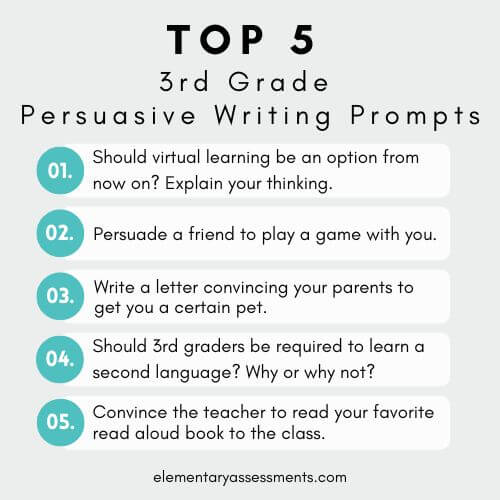
11. Children should be able to go to bed at whatever time they want.
12. Persuade your mom/dad to let you open a gift one day before your birthday.
13. What do you think about not assigning homework to students with good grades? Is doing so unfair to those with poorer grades?
14. Persuade your teacher to give class rewards every week.
15. Convince the teacher to participate in an activity with the class during recess.
16. Persuade your parents to buy you a new backpack.
17. Should the school week be shortened to four days?
18. Responding to writing prompts for 3rd graders is helpful.
19. Should smoking be illegal?
20. Convince your parents to give you an allowance for doing chores around the house.
21. Should third graders be required to learn a second language? If so, which one? If not, why not?
22. What are the pros and cons of responding to persuasive writing prompts for 3rd grade?
23. Persuade your teacher to read your favorite read-aloud book during reader’s workshop.
24. Do you think the number of hours that children watch television should be limited? Why or why not?
25. What are the pros and cons of wearing school uniforms?
26. Convince your parents to take you to a particular place.
27. Write a letter convincing your parents why you should have a new bike.
28. Pizza is better than spaghetti.
29. Make a respectful argument suggesting a change of a school rule.
30. For state testing, should third graders be required to complete a writing portion? Why or why not?
31. What is your opinion about pets in restaurants?
32. Should all students be required to learn to type? Why or why not?
33. Cooking classes should be taught in school.
34. A stretching break should be included in every lesson over 30 minutes.
35. Convince the teacher to dismiss class a few minutes earlier.
36. Teacher assistant is the best classroom helper job.
37. Animals deserve respect just as much as humans.
38. Third graders should volunteer in the local community.
39. Action figures are better than barbie dolls.
40. Hamsters make better pets than turtles. Do you agree? Why or why not?
41. Which is best…a slice of pizza or chicken nuggets?
42. Cafeteria food should be free for all students.
43. Mermaids really do exist.
44. Students should be allowed to sit in the hallway while working.
45. Everyone should have a hobby.
46. Birthday parties should be allowed at school but only during lunchtime.
47. Study skills should be taught to all students.
48. Students should drink more water than fruit juice.
49. Borrowing books is better than buying books.
50. Vanilla ice cream tastes better than strawberry.
51. Third graders should be able to sit wherever they want during a school assembly.
Final Thoughts: Persuasive Writing Prompts for 3rd Grade
Now you have an assortment of third grade persuasive writing prompts and topics to use during writer’s workshop.
Related: mentor texts that teach persuasive writing
Free Printable Argument Writing Worksheets for 3rd Grade
Argument Writing worksheets for Grade 3 Reading & Writing teachers: Discover a variety of free printable resources to help students develop persuasive writing skills and critical thinking.

Explore Argument Writing Worksheets by Grades
- kindergarten
Explore Other Subject Worksheets for grade 3
- Social studies
- Social emotional
- Foreign language
- Reading & Writing
Explore printable Argument Writing worksheets for 3rd Grade
Argument Writing worksheets for Grade 3 are an essential resource for teachers looking to enhance their students' reading and writing skills. These worksheets are specifically designed to help third-grade students develop a strong foundation in nonfiction writing, which is a crucial aspect of their overall literacy development. By incorporating these worksheets into their lesson plans, teachers can provide their students with engaging and age-appropriate writing prompts that encourage them to think critically and express their ideas clearly. As students work through these exercises, they will gain valuable experience in constructing well-reasoned arguments, supporting their claims with evidence, and effectively communicating their thoughts in writing. Ultimately, Argument Writing worksheets for Grade 3 can play a vital role in fostering a love for reading and writing in young learners.
In addition to Argument Writing worksheets for Grade 3, Quizizz offers a wide range of resources that can help teachers create a dynamic and interactive learning environment for their students. This platform provides teachers with access to thousands of quizzes, games, and other educational materials that cover a variety of subjects, including reading, writing, and nonfiction writing. By incorporating Quizizz into their lesson plans, teachers can not only supplement their existing worksheets but also introduce new and engaging activities that cater to different learning styles and abilities. Furthermore, Quizizz allows teachers to track their students' progress and identify areas where they may need additional support or practice. With its diverse offerings and user-friendly interface, Quizizz is an invaluable tool for teachers seeking to enhance their students' reading and writing skills in Grade 3 and beyond.
Have a language expert improve your writing
Run a free plagiarism check in 10 minutes, generate accurate citations for free.
- Knowledge Base
- How to write an argumentative essay | Examples & tips
How to Write an Argumentative Essay | Examples & Tips
Published on July 24, 2020 by Jack Caulfield . Revised on July 23, 2023.
An argumentative essay expresses an extended argument for a particular thesis statement . The author takes a clearly defined stance on their subject and builds up an evidence-based case for it.
Instantly correct all language mistakes in your text
Upload your document to correct all your mistakes in minutes

Table of contents
When do you write an argumentative essay, approaches to argumentative essays, introducing your argument, the body: developing your argument, concluding your argument, other interesting articles, frequently asked questions about argumentative essays.
You might be assigned an argumentative essay as a writing exercise in high school or in a composition class. The prompt will often ask you to argue for one of two positions, and may include terms like “argue” or “argument.” It will frequently take the form of a question.
The prompt may also be more open-ended in terms of the possible arguments you could make.
Argumentative writing at college level
At university, the vast majority of essays or papers you write will involve some form of argumentation. For example, both rhetorical analysis and literary analysis essays involve making arguments about texts.
In this context, you won’t necessarily be told to write an argumentative essay—but making an evidence-based argument is an essential goal of most academic writing, and this should be your default approach unless you’re told otherwise.
Examples of argumentative essay prompts
At a university level, all the prompts below imply an argumentative essay as the appropriate response.
Your research should lead you to develop a specific position on the topic. The essay then argues for that position and aims to convince the reader by presenting your evidence, evaluation and analysis.
- Don’t just list all the effects you can think of.
- Do develop a focused argument about the overall effect and why it matters, backed up by evidence from sources.
- Don’t just provide a selection of data on the measures’ effectiveness.
- Do build up your own argument about which kinds of measures have been most or least effective, and why.
- Don’t just analyze a random selection of doppelgänger characters.
- Do form an argument about specific texts, comparing and contrasting how they express their thematic concerns through doppelgänger characters.
Prevent plagiarism. Run a free check.
An argumentative essay should be objective in its approach; your arguments should rely on logic and evidence, not on exaggeration or appeals to emotion.
There are many possible approaches to argumentative essays, but there are two common models that can help you start outlining your arguments: The Toulmin model and the Rogerian model.
Toulmin arguments
The Toulmin model consists of four steps, which may be repeated as many times as necessary for the argument:
- Make a claim
- Provide the grounds (evidence) for the claim
- Explain the warrant (how the grounds support the claim)
- Discuss possible rebuttals to the claim, identifying the limits of the argument and showing that you have considered alternative perspectives
The Toulmin model is a common approach in academic essays. You don’t have to use these specific terms (grounds, warrants, rebuttals), but establishing a clear connection between your claims and the evidence supporting them is crucial in an argumentative essay.
Say you’re making an argument about the effectiveness of workplace anti-discrimination measures. You might:
- Claim that unconscious bias training does not have the desired results, and resources would be better spent on other approaches
- Cite data to support your claim
- Explain how the data indicates that the method is ineffective
- Anticipate objections to your claim based on other data, indicating whether these objections are valid, and if not, why not.
Rogerian arguments
The Rogerian model also consists of four steps you might repeat throughout your essay:
- Discuss what the opposing position gets right and why people might hold this position
- Highlight the problems with this position
- Present your own position , showing how it addresses these problems
- Suggest a possible compromise —what elements of your position would proponents of the opposing position benefit from adopting?
This model builds up a clear picture of both sides of an argument and seeks a compromise. It is particularly useful when people tend to disagree strongly on the issue discussed, allowing you to approach opposing arguments in good faith.
Say you want to argue that the internet has had a positive impact on education. You might:
- Acknowledge that students rely too much on websites like Wikipedia
- Argue that teachers view Wikipedia as more unreliable than it really is
- Suggest that Wikipedia’s system of citations can actually teach students about referencing
- Suggest critical engagement with Wikipedia as a possible assignment for teachers who are skeptical of its usefulness.
You don’t necessarily have to pick one of these models—you may even use elements of both in different parts of your essay—but it’s worth considering them if you struggle to structure your arguments.
Regardless of which approach you take, your essay should always be structured using an introduction , a body , and a conclusion .
Like other academic essays, an argumentative essay begins with an introduction . The introduction serves to capture the reader’s interest, provide background information, present your thesis statement , and (in longer essays) to summarize the structure of the body.
Hover over different parts of the example below to see how a typical introduction works.
The spread of the internet has had a world-changing effect, not least on the world of education. The use of the internet in academic contexts is on the rise, and its role in learning is hotly debated. For many teachers who did not grow up with this technology, its effects seem alarming and potentially harmful. This concern, while understandable, is misguided. The negatives of internet use are outweighed by its critical benefits for students and educators—as a uniquely comprehensive and accessible information source; a means of exposure to and engagement with different perspectives; and a highly flexible learning environment.
The body of an argumentative essay is where you develop your arguments in detail. Here you’ll present evidence, analysis, and reasoning to convince the reader that your thesis statement is true.
In the standard five-paragraph format for short essays, the body takes up three of your five paragraphs. In longer essays, it will be more paragraphs, and might be divided into sections with headings.
Each paragraph covers its own topic, introduced with a topic sentence . Each of these topics must contribute to your overall argument; don’t include irrelevant information.
This example paragraph takes a Rogerian approach: It first acknowledges the merits of the opposing position and then highlights problems with that position.
Hover over different parts of the example to see how a body paragraph is constructed.
A common frustration for teachers is students’ use of Wikipedia as a source in their writing. Its prevalence among students is not exaggerated; a survey found that the vast majority of the students surveyed used Wikipedia (Head & Eisenberg, 2010). An article in The Guardian stresses a common objection to its use: “a reliance on Wikipedia can discourage students from engaging with genuine academic writing” (Coomer, 2013). Teachers are clearly not mistaken in viewing Wikipedia usage as ubiquitous among their students; but the claim that it discourages engagement with academic sources requires further investigation. This point is treated as self-evident by many teachers, but Wikipedia itself explicitly encourages students to look into other sources. Its articles often provide references to academic publications and include warning notes where citations are missing; the site’s own guidelines for research make clear that it should be used as a starting point, emphasizing that users should always “read the references and check whether they really do support what the article says” (“Wikipedia:Researching with Wikipedia,” 2020). Indeed, for many students, Wikipedia is their first encounter with the concepts of citation and referencing. The use of Wikipedia therefore has a positive side that merits deeper consideration than it often receives.
Here's why students love Scribbr's proofreading services
Discover proofreading & editing
An argumentative essay ends with a conclusion that summarizes and reflects on the arguments made in the body.
No new arguments or evidence appear here, but in longer essays you may discuss the strengths and weaknesses of your argument and suggest topics for future research. In all conclusions, you should stress the relevance and importance of your argument.
Hover over the following example to see the typical elements of a conclusion.
The internet has had a major positive impact on the world of education; occasional pitfalls aside, its value is evident in numerous applications. The future of teaching lies in the possibilities the internet opens up for communication, research, and interactivity. As the popularity of distance learning shows, students value the flexibility and accessibility offered by digital education, and educators should fully embrace these advantages. The internet’s dangers, real and imaginary, have been documented exhaustively by skeptics, but the internet is here to stay; it is time to focus seriously on its potential for good.
If you want to know more about AI tools , college essays , or fallacies make sure to check out some of our other articles with explanations and examples or go directly to our tools!
- Ad hominem fallacy
- Post hoc fallacy
- Appeal to authority fallacy
- False cause fallacy
- Sunk cost fallacy
College essays
- Choosing Essay Topic
- Write a College Essay
- Write a Diversity Essay
- College Essay Format & Structure
- Comparing and Contrasting in an Essay
(AI) Tools
- Grammar Checker
- Paraphrasing Tool
- Text Summarizer
- AI Detector
- Plagiarism Checker
- Citation Generator
An argumentative essay tends to be a longer essay involving independent research, and aims to make an original argument about a topic. Its thesis statement makes a contentious claim that must be supported in an objective, evidence-based way.
An expository essay also aims to be objective, but it doesn’t have to make an original argument. Rather, it aims to explain something (e.g., a process or idea) in a clear, concise way. Expository essays are often shorter assignments and rely less on research.
At college level, you must properly cite your sources in all essays , research papers , and other academic texts (except exams and in-class exercises).
Add a citation whenever you quote , paraphrase , or summarize information or ideas from a source. You should also give full source details in a bibliography or reference list at the end of your text.
The exact format of your citations depends on which citation style you are instructed to use. The most common styles are APA , MLA , and Chicago .
The majority of the essays written at university are some sort of argumentative essay . Unless otherwise specified, you can assume that the goal of any essay you’re asked to write is argumentative: To convince the reader of your position using evidence and reasoning.
In composition classes you might be given assignments that specifically test your ability to write an argumentative essay. Look out for prompts including instructions like “argue,” “assess,” or “discuss” to see if this is the goal.
Cite this Scribbr article
If you want to cite this source, you can copy and paste the citation or click the “Cite this Scribbr article” button to automatically add the citation to our free Citation Generator.
Caulfield, J. (2023, July 23). How to Write an Argumentative Essay | Examples & Tips. Scribbr. Retrieved March 20, 2024, from https://www.scribbr.com/academic-essay/argumentative-essay/
Is this article helpful?

Jack Caulfield
Other students also liked, how to write a thesis statement | 4 steps & examples, how to write topic sentences | 4 steps, examples & purpose, how to write an expository essay, "i thought ai proofreading was useless but..".
I've been using Scribbr for years now and I know it's a service that won't disappoint. It does a good job spotting mistakes”
STAAR Prep: A K-5 Argumentative/Opinion Writing Strategy
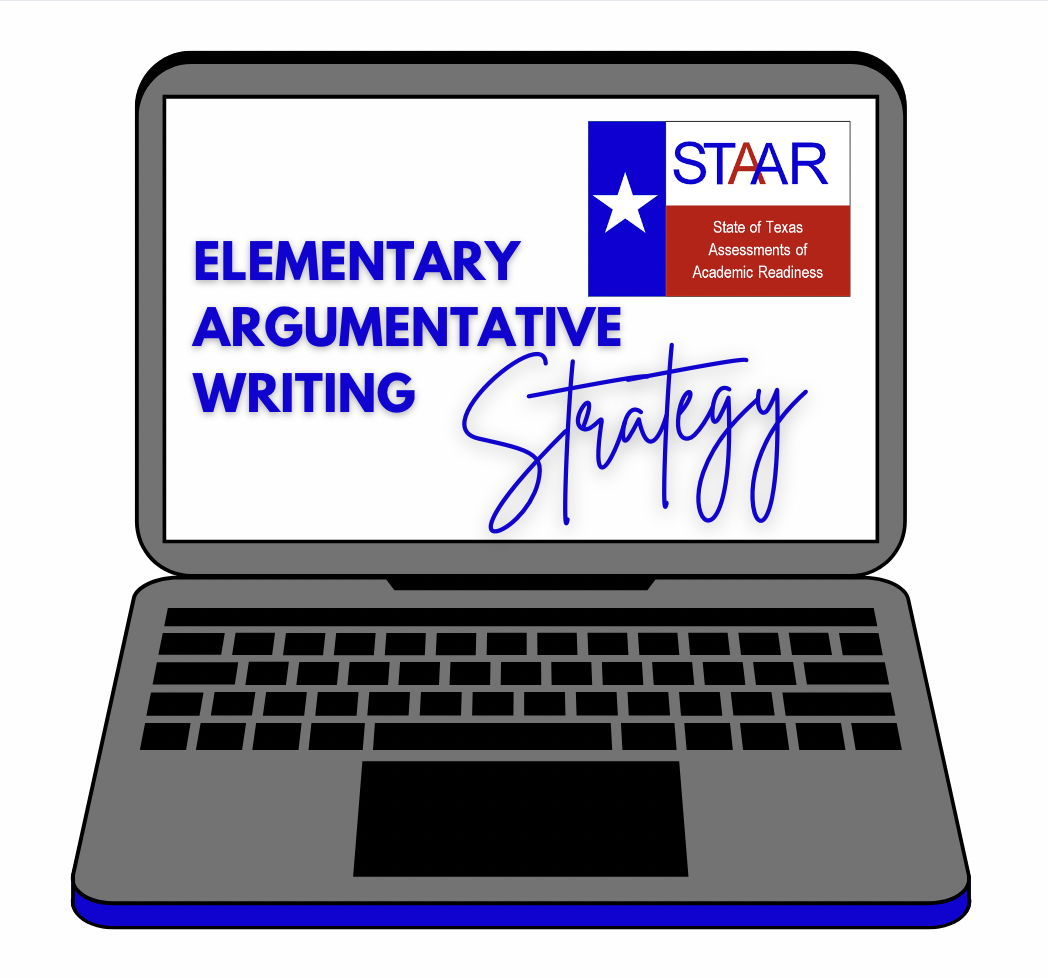
As we all know here in Texas, every grade level will have an “extended constructed response” on the STAAR test this school year. This response will either be informational or argumentative and will be an “essay.” Let’s take a look at exemplars and rubrics before we dive into an argumentative/opinion writing strategy for the elementary grades.
STAAR Test Example Responses
Here are some exemplars for grades 3 and 5 (for both short and extended constructed responses) provided by TEA (Texas Education Agency). These prompts and exemplars come from the field test, and this document walks you through the scoring. I go over more information about the constructed responses, STAAR test tools, and provide a few resources in Reading Language Arts STAAR Test Resources .
STAAR Argumentative Writing Rubrics
- RLA Grades 3-5 Argumentative/Opinion Writing Rubric (10/18/22)
- RLA Grades 3-5 Argumentative/Opinion Writing Rubric-Spanish (10/18/22)
- RLA Grades 3-5 Informational Writing Rubric (10/18/22)
- RLA Grades 3-5 Informational Writing Rubric-Spanish (10/18/22)
What’s the Difference Between Short and Extended Constructive Responses?
Here are exemplars from the stand-alone field test. The 5th grade prompts and responses are for the same passage, “Steam and Sail”. The responses on the left are short constructed responses (SCR), and the one on the right is an extended constructive response (ECR). The grade 3 response is within the writing domain, not the reading domain. There are no exemplars for grades 3 and 4 to reference for ECR in the scoring guide.
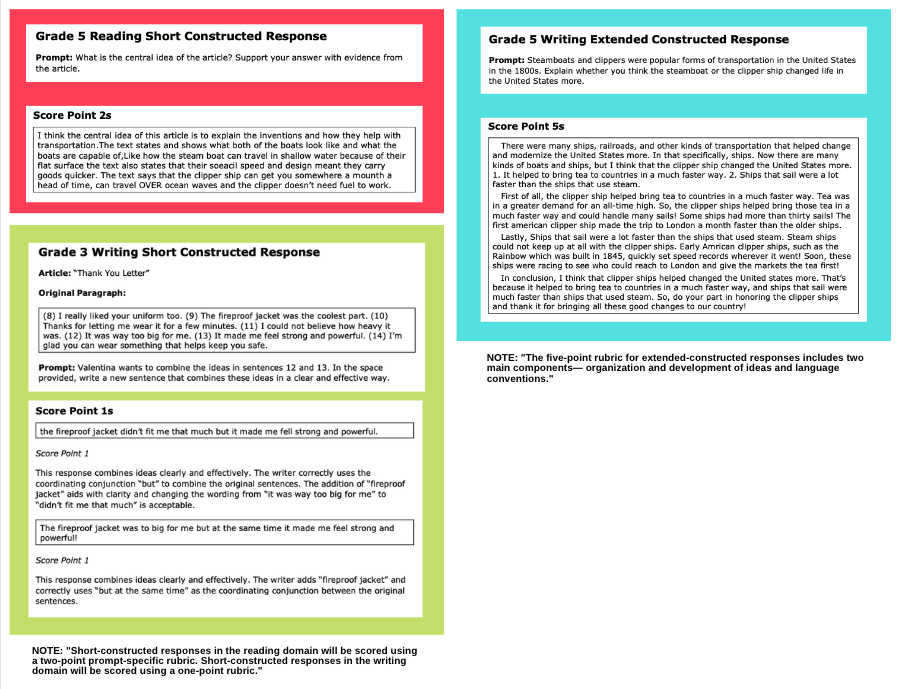
How to Teach Argumentative/Opinion Writing
So, of course, there are lots of ways to teach opinion writing to elementary students. But I’m a huge fan of the Gradual Release of Responsibility (GRR) , and I’m also a huge fan of discussion and verbal practice before beginning the writing process. That said, I’m going to walk through using GRR with some resources for teaching opinion/argumentative writing at the elementary level. This strategy is adaptable and meant to be built on over time, so the example given isn’t necessarily 5th grade, score point 5 level, but it can get students there with practice and some adapting!
Review: Fact vs. Opinion
Whether you’re teaching first grade or fifth grade, it’s always good to start with a review of the difference between fact and opinion. Here are a few resources for this.
- Florida Center for Reading Research Fact or Opinion Game
- Factile Fact vs. Opinion Game
- Teaching with a Mountain View: Four Activities to Teach Fact vs. Opinion in Upper Elementary
Talk Before You Write!
This is what I like to call, the “Speak Cycle.” Students may need to practice one or more of these steps, or the whole cycle, multiple times before moving on to writing. Speaking before writing helps students learn to organize their thoughts, look for text evidence, and also familiarizes them with proper sentence structures for opinion writing before they actually start writing. You might think, “Ok, maybe for lower elementary.” Sure, but even older students benefit from verbal practice before writing! It’s a form of rehearsal and planning.
1. Whole Group: Read the text. Discuss opinions as a class. Highlight the evidence.
Before broaching the topic of supporting evidence for an opinion, read the text and discuss opinions. Then ask students for supporting evidence. It’s much easier to talk about supporting evidence than it is to start writing about it from the get go! Here is an example text that works well for third and fourth grade from Education.com . I recommend starting with short texts and then, as stamina improves, introducing longer texts over time.
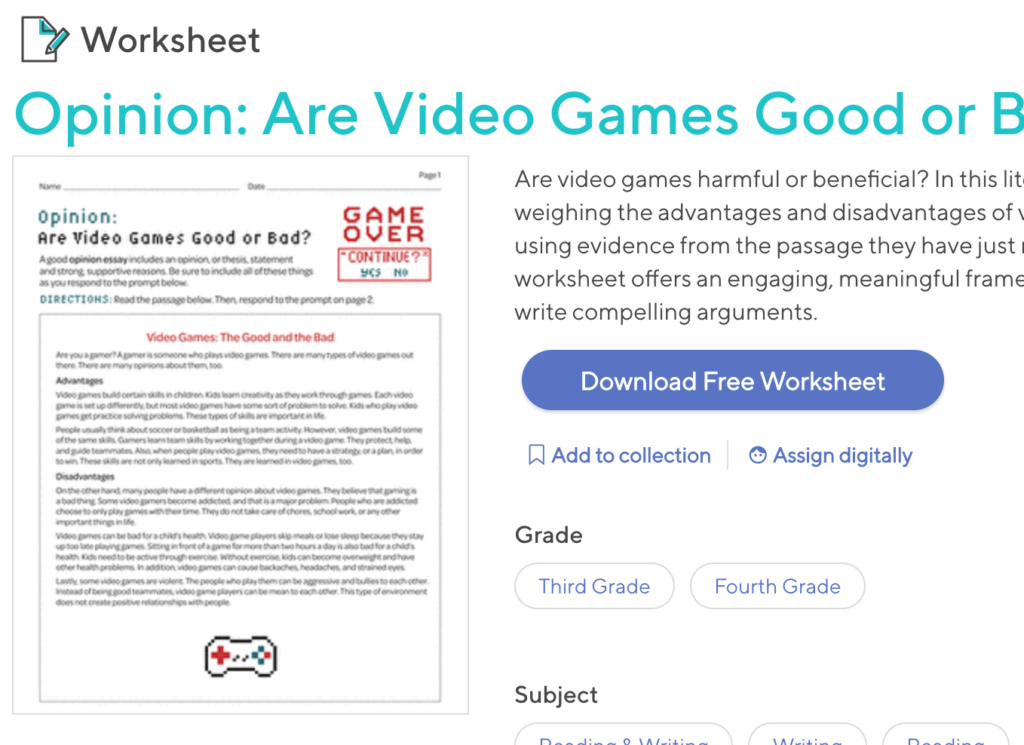
“Today, we’re going to read a text together about ___________. We’re going to discuss our opinions on ___________ based on what we read, and I’m going to highlight facts from the text to help support our opinion.” [Read the text] [Read the question] “So, what are our opinions?” [Student one offers an opinion.] “Thanks for sharing your opinion! What information in this text led you to think that?” [Highlight what the student references in the text. Repeat this with other examples.] “Ok! So, from our reading today, we formed the opinion ______. And we formed that opinion because [read off highlights of the text].”
In this practice, you are showing the students how to identify and highlight supporting evidence in the text, but this is first a verbal exercise. Start with easier texts and move to more difficult texts as students become more autonomous.
You can create your own questions, but here are a few resources that offer texts with questions for opinion writing.
- Education.com
- Ereadingworksheets.com
- National Council of Teachers of English (NCTE)
2. Small Group: Read the text. Discuss opinions with a small group. Highlight the evidence together.
This works best if you group students on similar reading levels. Give each student in the group the same short text that’s on their reading level. Read it together, discuss an opinion, and have students highlight the supporting facts with your guidance. Then, have students verbalize their opinions and reference the highlighted text evidence. Students should speak using the same sentence structures you want them to use when writing. Having these up as a visual is great for practice! This is all to get students ready to write.
- “I think…”
- “In my opinion,…”
- “I believe that…”
- “This is my opinion because…”
- “According to the text,…”
- “First, the author states…”
- “Second, I read that…”
3. Independently: Students read the text, highlight evidence, and discuss their opinion and supporting evidence with a partner or group.
Have students read a short text, think about their opinion, and highlight facts to support their opinion on their own. Students can discuss an explanation of their opinion and text evidence with a partner, or they can explain it in a small group setting. Students should still be speaking using the same sentence structures you would like them to write with.
It’s Time to Write!
Now that students are familiar with reading, forming an opinion, highlighting evidence to support their opinion, and using sentence structures verbally, it’s time to start writing. But it’s not quite time for them to write independently. First, we will model good writing for them, following a similar process to the speaking cycle.
1. Whole Group: Read the text. Highlight the evidence. Model the writing for the class.
So this step is similar to step one of the speak cycle, but instead of just discussing, you are going to be modeling the writing. Here’s one formula I like to use called, “It’s Peanut Butter Jelly Time!,” and I’ve included an example using the video game article from the beginning of this post.
The Bread: The Introduction (2-3 sentences)
- Write one sentence to state your opinion.
- Write a second sentence introducing two main facts from the text that support your opinion.
“In my opinion, video games are harmful to kids. Video games can be unhealthy. They can also be too violent.” (Just an example! This is not necessarily reflective of my actual opinion on video games.)
The Peanut Butter : Paragraph 2 (2-3 sentences)
- Write a few sentences to support the first fact.
“According to the text, video games can be unhealthy if children play them for too long and don’t move around or exercise. This can make kids overweight and have health issue.”
The Jelly : Paragraph 3 (2-3 sentences)
- Write a few sentences to support the second fact.
“Sometimes, violence can make kids fight, and this can be harmful to friendships. Violence isn’t good for kids’ brains and can lead them to become bullies.”
The Bread: The Conclusion (2-3 sentences)
- Say your opinion – again.
- Say why your opinion is true – again.
“I believe that video games can be harmful to kids. Sitting for too long in front of the game can cause health problems and violence can lead to aggressive behavior. It’s better for kids to be active and be more positive and less violent.”
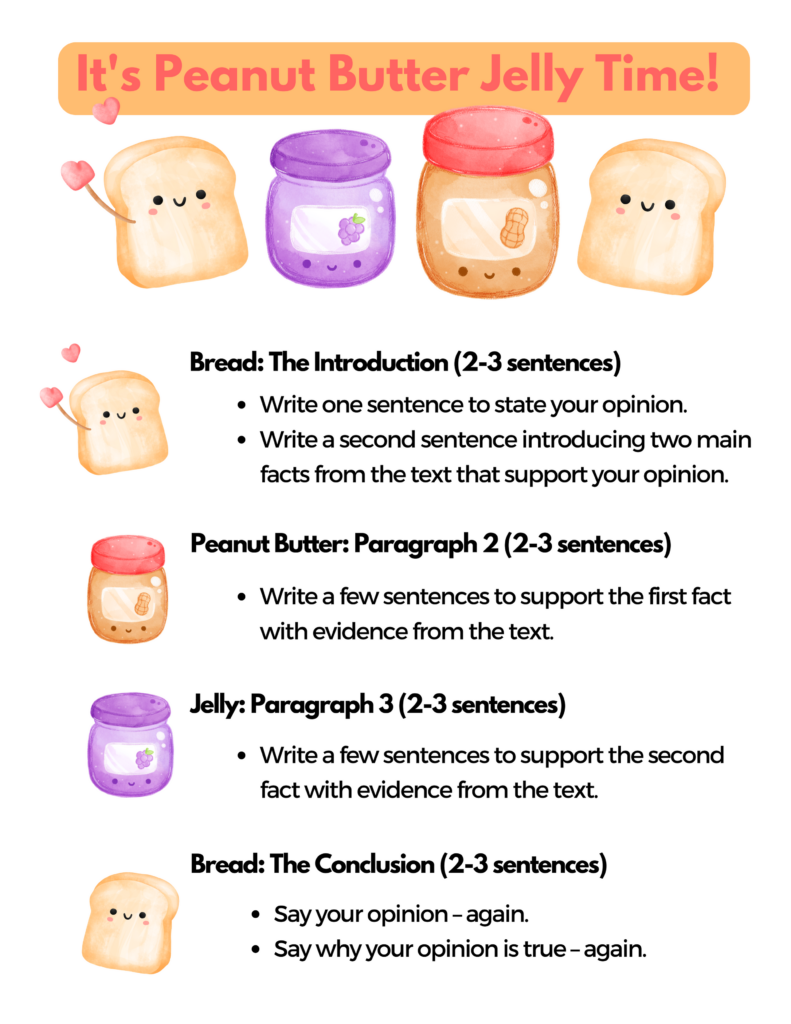
2. Partnered Writing: Students read the text together, highlight the evidence, and write with a partner.
It’s similar to the whole group exercise, except that students are practicing writing more independently with a writing partner/buddy. In this step, you can offer students graphic organizers or an outline template to help them remember all the elements of their argumentative writing. They can work together to write one essay or they can each write an essay and then review each other’s writing.
3. Independently: Read the text. Highlight the evidence. Write the essay.
At this stage, students are practicing writing on their own. They may or may not need supports like sentence starters, graphic organizers , checklists , and visuals to reference in the room. But the goal is for students to be able to produce writing that expresses their opinion in response to a text and provide text evidence to support that opinion.
Practice, Practice, Practice!
It takes a lot of time and a lot of repetitive practice. As Miguel Guhlin references in his article, Writing Strategies: Insights from a Twitter Chat , discussing, teaching sentence structures/vocabulary, and showing examples isn’t enough. Deliberate, repetitive practice, and time, are key to teaching writing.
Do you have other ideas, strategies, or resources that have worked well for you and your K-5 students when it comes to argumentative/opinion writing? Please share them with us in the chat! We’d love to hear what’s worked in your classroom.
Additional STAAR and TEKS Articles You May Find Useful
Reading Language Arts STAAR Test Resources
The K-5 ELAR TEKS and Free, Editable Spreadsheets
The K-5 Math TEKS and Free, Editable Spreadsheets
A Practical Strategy for Teaching Editing Skills
A Powerful and Easy Strategy for Teaching Text Evidence

Emily has been in education since 2008. Prior to joining TCEA in 2021, she worked as a preK-8 grade principal for four years. Additionally, she taught middle school music, preschool, prekindergarten, and second grade in a trilingual school setting. Before that, she was a K-8 technology integrator and taught second through fifth grade enrichment classes and kindergarten, fifth, and sixth grade technology classes. She has a master’s degree in teaching, specializing in elementary education, and her Certificate of School Management and Leadership (CSML) from Harvard Graduate School of Education. Outside of work, she enjoys seeing movies, attending concerts, going camping and hiking, and spending time with her two cats.

Writing Strategies: Insights from a Twitter Chat
Resources shared at the 2023 tcea convention & exposition, you may also like, the new digital sat® and the future of..., five powerful citation tools to unlock academic success, nanowrimo’s young writer’s program (ywp), ai meme generators and classroom activities, cer resources for the science classroom, two new google ai tools: help me write..., how reliable are ai detectors, what you need to know about copyright, nine tips for overcoming test anxiety, four ways ai can help teach poetry.
Loved the succinct info!
Leave a Comment Cancel Reply
Save my name, email, and website in this browser for the next time I comment.
You've Made It This Far
Like what you're reading? Sign up to stay connected with us.
*By downloading, you are subscribing to our email list which includes our daily blog straight to your inbox and marketing emails. It can take up to 7 days for you to be added. You can change your preferences at any time.
You have Successfully Subscribed!
By subscribing, you will receive our daily blog, newsletter, and marketing emails.
- Share full article
Advertisement
Supported by
student opinion
130 New Prompts for Argumentative Writing
Questions on everything from mental health and sports to video games and dating. Which ones inspire you to take a stand?

By The Learning Network
Note: We have an updated version of this list, with 300 new argumentative writing prompts .
What issues do you care most about? What topics do you find yourself discussing passionately, whether online, at the dinner table, in the classroom or with your friends?
In Unit 5 of our free yearlong writing curriculum and related Student Editorial Contest , we invite students to research and write about the issues that matter to them, whether that’s Shakespeare , health care , standardized testing or being messy .
But with so many possibilities, where does one even begin? Try our student writing prompts.
In 2017, we compiled a list of 401 argumentative writing prompts , all drawn from our daily Student Opinion column . Now, we’re rounding up 130 more we’ve published since then ( available here as a PDF ). Each prompt links to a free Times article as well as additional subquestions that can help you think more deeply about it.
You might use this list to inspire your own writing and to find links to reliable resources about the issues that intrigue you. But even if you’re not participating in our contest, you can use these prompts to practice the kind of low-stakes writing that can help you hone your argumentation skills.
So scroll through the list below with questions on everything from sports and mental health to dating and video games and see which ones inspire you to take a stand.
Please note: Many of these prompts are still open to comment by students 13 and up.
Technology & Social Media
1. Do Memes Make the Internet a Better Place? 2. Does Online Public Shaming Prevent Us From Being Able to Grow and Change? 3. How Young Is Too Young to Use Social Media? 4. Should the Adults in Your Life Be Worried by How Much You Use Your Phone? 5. Is Your Phone Love Hurting Your Relationships? 6. Should Kids Be Social Media Influencers? 7. Does Grammar Still Matter in the Age of Twitter? 8. Should Texting While Driving Be Treated Like Drunken Driving? 9. How Do You Think Technology Affects Dating?
10. Are Straight A’s Always a Good Thing? 11. Should Schools Teach You How to Be Happy? 12. How Do You Think American Education Could Be Improved? 13. Should Schools Test Their Students for Nicotine and Drug Use? 14. Can Social Media Be a Tool for Learning and Growth in Schools? 15. Should Facial Recognition Technology Be Used in Schools? 16. Should Your School Day Start Later? 17. How Should Senior Year in High School Be Spent? 18. Should Teachers Be Armed With Guns? 19. Is School a Place for Self-Expression? 20. Should Students Be Punished for Not Having Lunch Money? 21. Is Live-Streaming Classrooms a Good Idea? 22. Should Gifted and Talented Education Be Eliminated? 23. What Are the Most Important Things Students Should Learn in School? 24. Should Schools Be Allowed to Censor Student Newspapers? 25. Do You Feel Your School and Teachers Welcome Both Conservative and Liberal Points of View? 26. Should Teachers and Professors Ban Student Use of Laptops in Class? 27. Should Schools Teach About Climate Change? 28. Should All Schools Offer Music Programs? 29. Does Your School Need More Money? 30. Should All Schools Teach Cursive? 31. What Role Should Textbooks Play in Education? 32. Do Kids Need Recess?
College & Career
33. What Is Your Reaction to the College Admissions Cheating Scandal? 34. Is the College Admissions Process Fair? 35. Should Everyone Go to College? 36. Should College Be Free? 37. Are Lavish Amenities on College Campuses Useful or Frivolous? 38. Should ‘Despised Dissenters’ Be Allowed to Speak on College Campuses? 39. How Should the Problem of Sexual Assault on Campuses Be Addressed? 40. Should Fraternities Be Abolished? 41. Is Student Debt Worth It?
Mental & Physical Health
42. Should Students Get Mental Health Days Off From School? 43. Is Struggle Essential to Happiness? 44. Does Every Country Need a ‘Loneliness Minister’? 45. Should Schools Teach Mindfulness? 46. Should All Children Be Vaccinated? 47. What Do You Think About Vegetarianism? 48. Do We Worry Too Much About Germs? 49. What Advice Should Parents and Counselors Give Teenagers About Sexting? 50. Do You Think Porn Influences the Way Teenagers Think About Sex?
Race & Gender
51. How Should Parents Teach Their Children About Race and Racism? 52. Is America ‘Backsliding’ on Race? 53. Should All Americans Receive Anti-Bias Education? 54. Should All Companies Require Anti-Bias Training for Employees? 55. Should Columbus Day Be Replaced With Indigenous Peoples Day? 56. Is Fear of ‘The Other’ Poisoning Public Life? 57. Should the Boy Scouts Be Coed? 58. What Is Hard About Being a Boy?
59. Can You Separate Art From the Artist? 60. Are There Subjects That Should Be Off-Limits to Artists, or to Certain Artists in Particular? 61. Should Art Come With Trigger Warnings? 62. Should Graffiti Be Protected? 63. Is the Digital Era Improving or Ruining the Experience of Art? 64. Are Museums Still Important in the Digital Age? 65. In the Age of Digital Streaming, Are Movie Theaters Still Relevant? 66. Is Hollywood Becoming More Diverse? 67. What Stereotypical Characters Make You Cringe? 68. Do We Need More Female Superheroes? 69. Do Video Games Deserve the Bad Rap They Often Get? 70. Should Musicians Be Allowed to Copy or Borrow From Other Artists? 71. Is Listening to a Book Just as Good as Reading It? 72. Is There Any Benefit to Reading Books You Hate?
73. Should Girls and Boys Sports Teams Compete in the Same League? 74. Should College Athletes Be Paid? 75. Are Youth Sports Too Competitive? 76. Is It Selfish to Pursue Risky Sports Like Extreme Mountain Climbing? 77. How Should We Punish Sports Cheaters? 78. Should Technology in Sports Be Limited? 79. Should Blowouts Be Allowed in Youth Sports? 80. Is It Offensive for Sports Teams and Their Fans to Use Native American Names, Imagery and Gestures?
81. Is It Wrong to Focus on Animal Welfare When Humans Are Suffering? 82. Should Extinct Animals Be Resurrected? If So, Which Ones? 83. Are Emotional-Support Animals a Scam? 84. Is Animal Testing Ever Justified? 85. Should We Be Concerned With Where We Get Our Pets? 86. Is This Exhibit Animal Cruelty or Art?
Parenting & Childhood
87. Who Should Decide Whether a Teenager Can Get a Tattoo or Piercing? 88. Is It Harder to Grow Up in the 21st Century Than It Was in the Past? 89. Should Parents Track Their Teenager’s Location? 90. Is Childhood Today Over-Supervised? 91. How Should Parents Talk to Their Children About Drugs? 92. What Should We Call Your Generation? 93. Do Other People Care Too Much About Your Post-High School Plans? 94. Do Parents Ever Cross a Line by Helping Too Much With Schoolwork? 95. What’s the Best Way to Discipline Children? 96. What Are Your Thoughts on ‘Snowplow Parents’? 97. Should Stay-at-Home Parents Be Paid? 98. When Do You Become an Adult?
Ethics & Morality
99. Why Do Bystanders Sometimes Fail to Help When They See Someone in Danger? 100. Is It Ethical to Create Genetically Edited Humans? 101. Should Reporters Ever Help the People They Are Covering? 102. Is It O.K. to Use Family Connections to Get a Job? 103. Is $1 Billion Too Much Money for Any One Person to Have? 104. Are We Being Bad Citizens If We Don’t Keep Up With the News? 105. Should Prisons Offer Incarcerated People Education Opportunities? 106. Should Law Enforcement Be Able to Use DNA Data From Genealogy Websites for Criminal Investigations? 107. Should We Treat Robots Like People?
Government & Politics
108. Does the United States Owe Reparations to the Descendants of Enslaved People? 109. Do You Think It Is Important for Teenagers to Participate in Political Activism? 110. Should the Voting Age Be Lowered to 16? 111. What Should Lawmakers Do About Guns and Gun Violence? 112. Should Confederate Statues Be Removed or Remain in Place? 113. Does the U.S. Constitution Need an Equal Rights Amendment? 114. Should National Monuments Be Protected by the Government? 115. Should Free Speech Protections Include Self Expression That Discriminates? 116. How Important Is Freedom of the Press? 117. Should Ex-Felons Have the Right to Vote? 118. Should Marijuana Be Legal? 119. Should the United States Abolish Daylight Saving Time? 120. Should We Abolish the Death Penalty? 121. Should the U.S. Ban Military-Style Semiautomatic Weapons? 122. Should the U.S. Get Rid of the Electoral College? 123. What Do You Think of President Trump’s Use of Twitter? 124. Should Celebrities Weigh In on Politics? 125. Why Is It Important for People With Different Political Beliefs to Talk to Each Other?
Other Questions
126. Should the Week Be Four Days Instead of Five? 127. Should Public Transit Be Free? 128. How Important Is Knowing a Foreign Language? 129. Is There a ‘Right Way’ to Be a Tourist? 130. Should Your Significant Other Be Your Best Friend?
- Grades 6-12
- School Leaders
FREE Book Bracket Template. For March and Beyond!
101 Interesting Persuasive Essay Topics for Kids and Teens
Use your words to sway the reader.
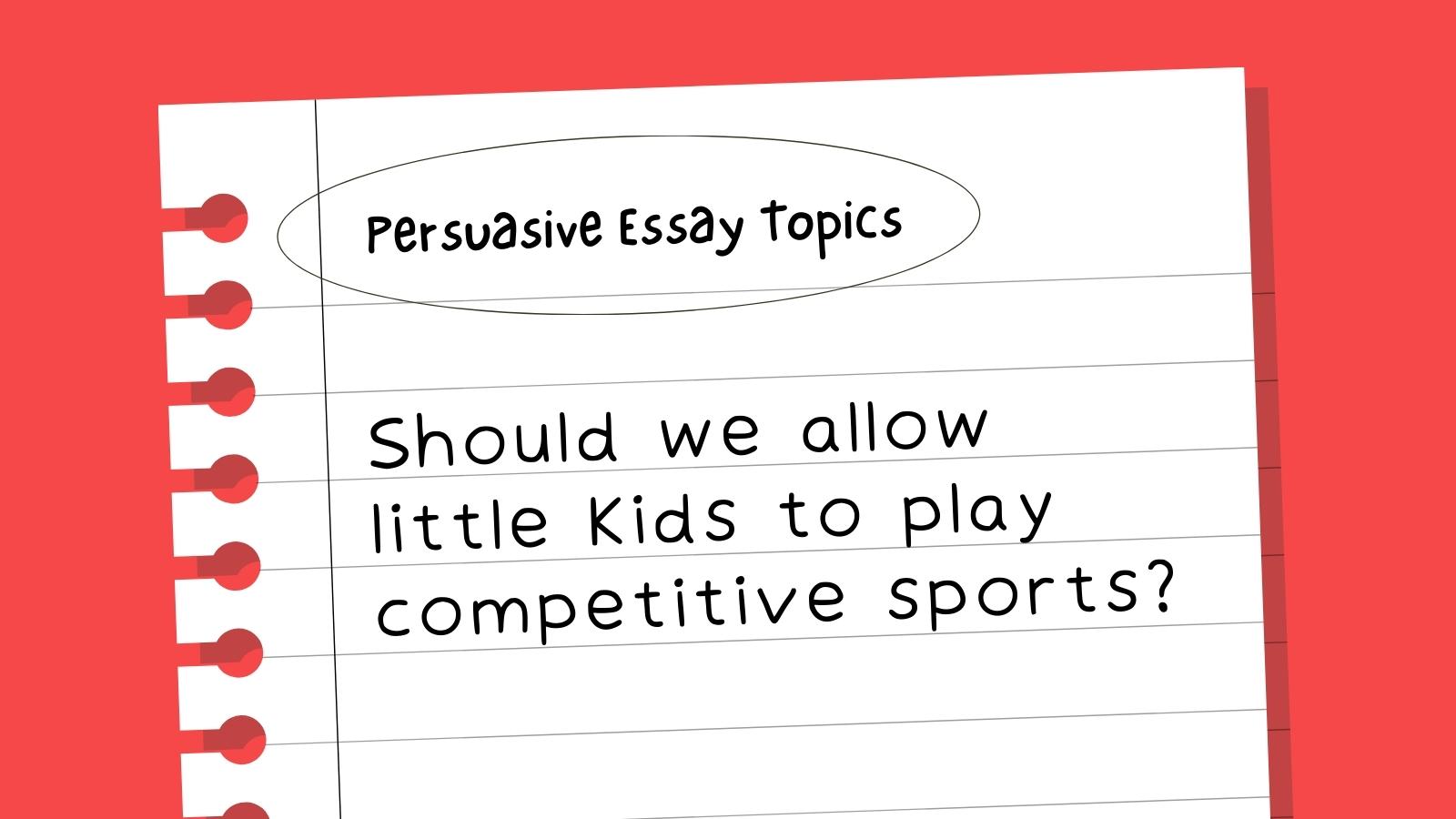
Persuasive writing is one of those skills that can help students succeed in real life. Persuasive essays are similar to argumentative , but they rely less on facts and more on emotion to sway the reader. It’s important to know your audience so you can anticipate any counterarguments they might make and try to overcome them. Try reading some mentor texts to show kids great examples of opinion writing. Then use these persuasive essay topics for practice.
School and Education Persuasive Essay Topics
Life and ethics persuasive essay topics, science and technology persuasive essay topics, sports and entertainment persuasive essay topics, just for fun persuasive essay topics.
- Do you think homework should be required, optional, or not given at all?

- Students should/should not be able to use their phones during the school day.
- Should schools have dress codes?
- If I could change one school rule, it would be …
- Is year-round school a good idea?
- Should we stop giving final exams?
- Is it better to be good at academics or good at sports?
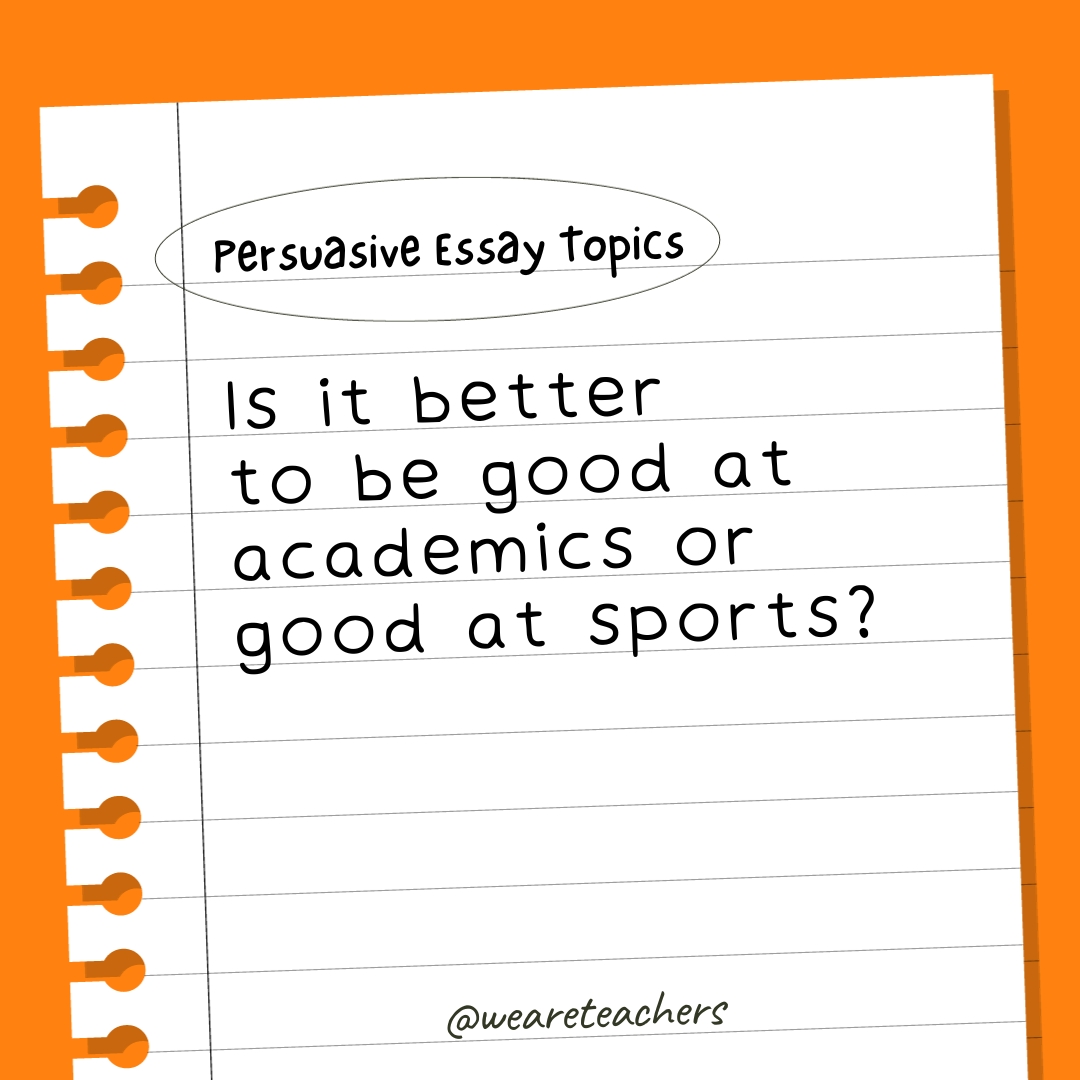
- Which is better, private schools or public schools?
- Should every student have to participate in athletics?
- Do you think schools should ban junk food from their cafeterias?
- Should students be required to volunteer in their communities?
- What is the most important school subject?
- Are letter grades helpful, or should we replace them with something else?
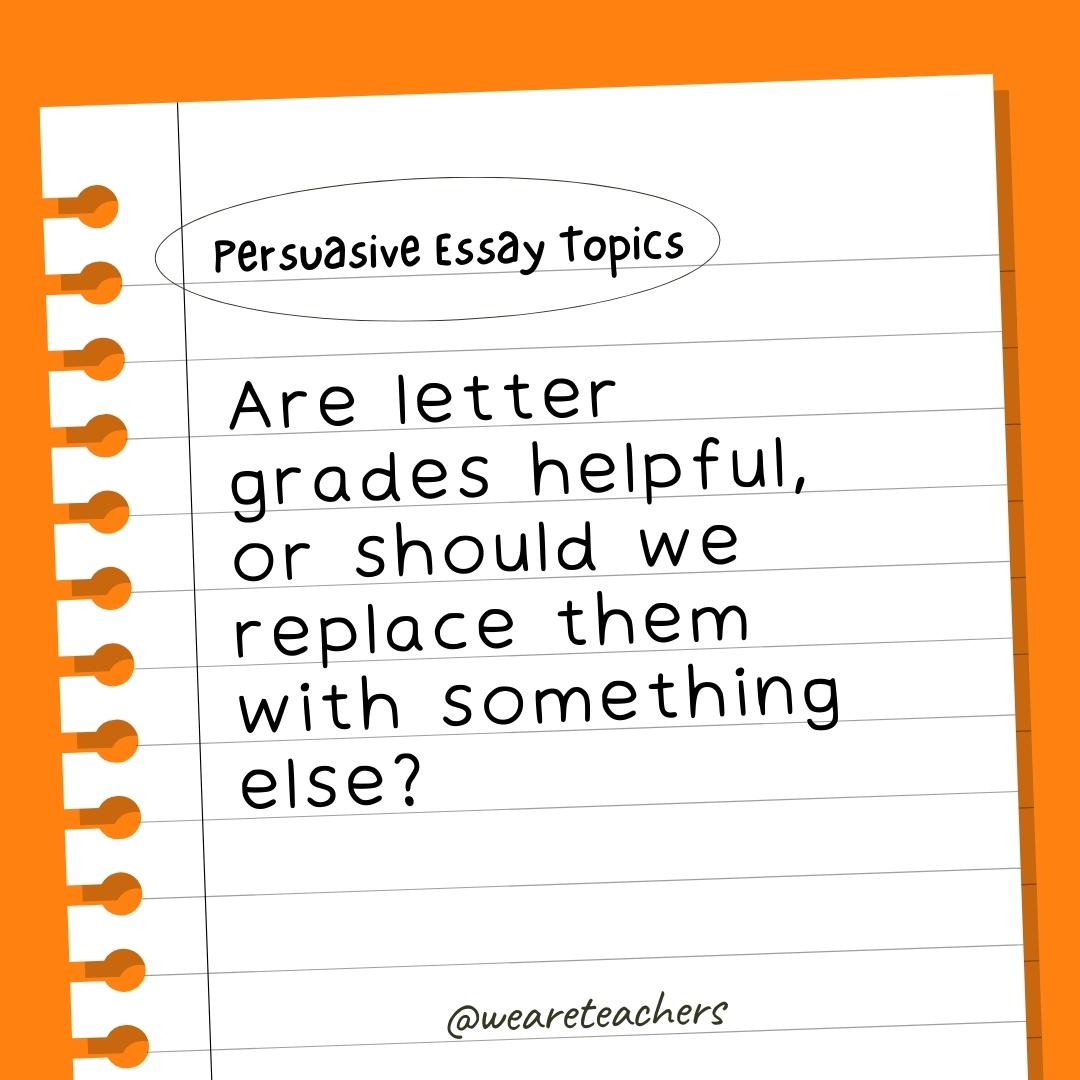
- Is it ever OK to cheat on homework or a test?
- Should students get to grade their teachers?
- Do you think college should be free for anyone who wants to attend?
- Should schools be allowed to ban some books from their libraries?
- Which is better, book smarts or street smarts?
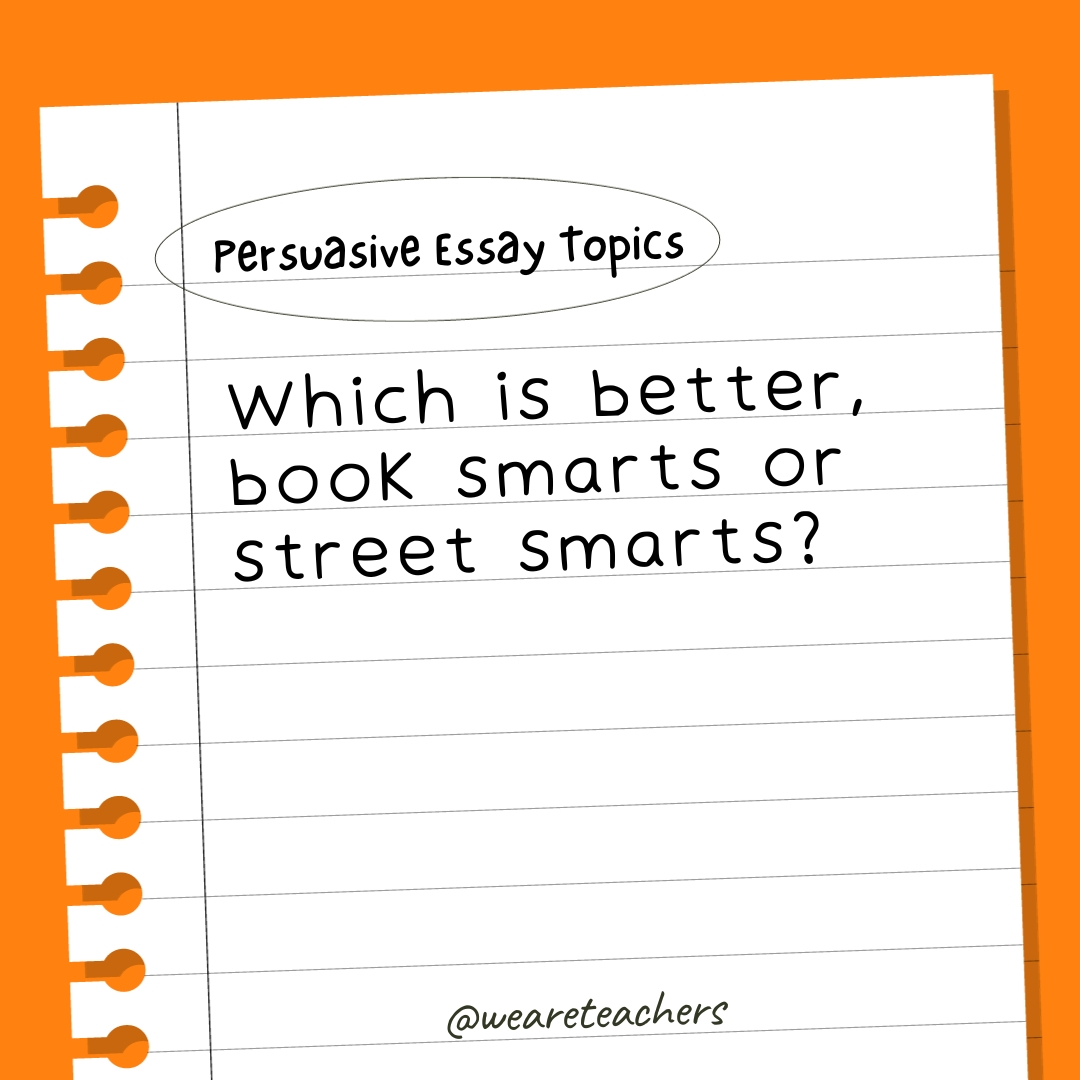
- Should all students have to learn a foreign language?
- Are single-gender schools better or worse for students?
- Is it OK to eat animals?
- What animal makes the best pet?
- Visit an animal shelter, choose an animal that needs a home, and write an essay persuading someone to adopt that animal.
- If you find money on the ground, should you try to find the person who lost it, or is it yours to keep?
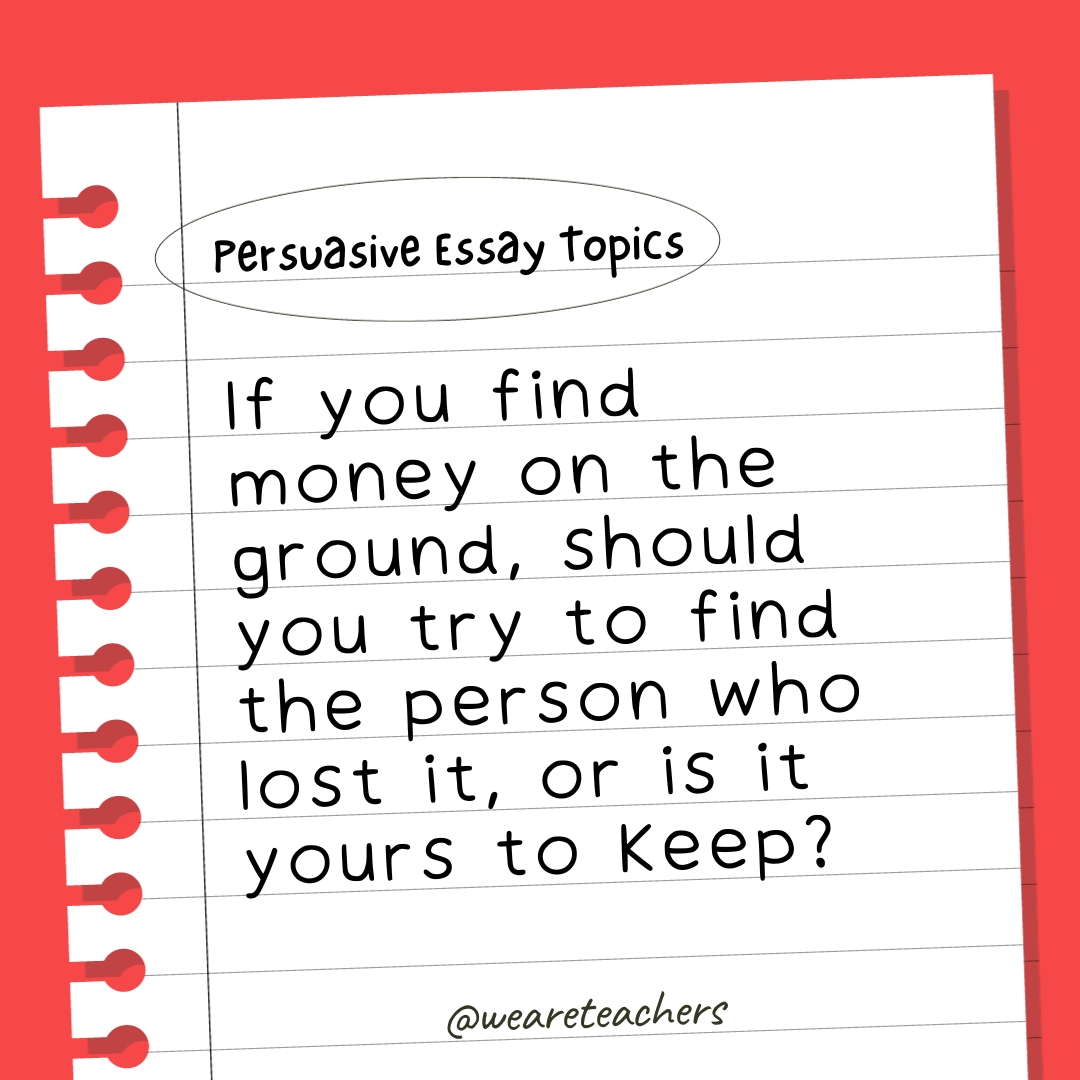
- Who faces more peer pressure, girls or boys?
- Should all Americans be required to vote?
- Is it better to be kind or truthful?
- Which is better, giving or receiving?
- Is it OK to keep animals in zoos?
- Should we change the minimum driving age in the United States?
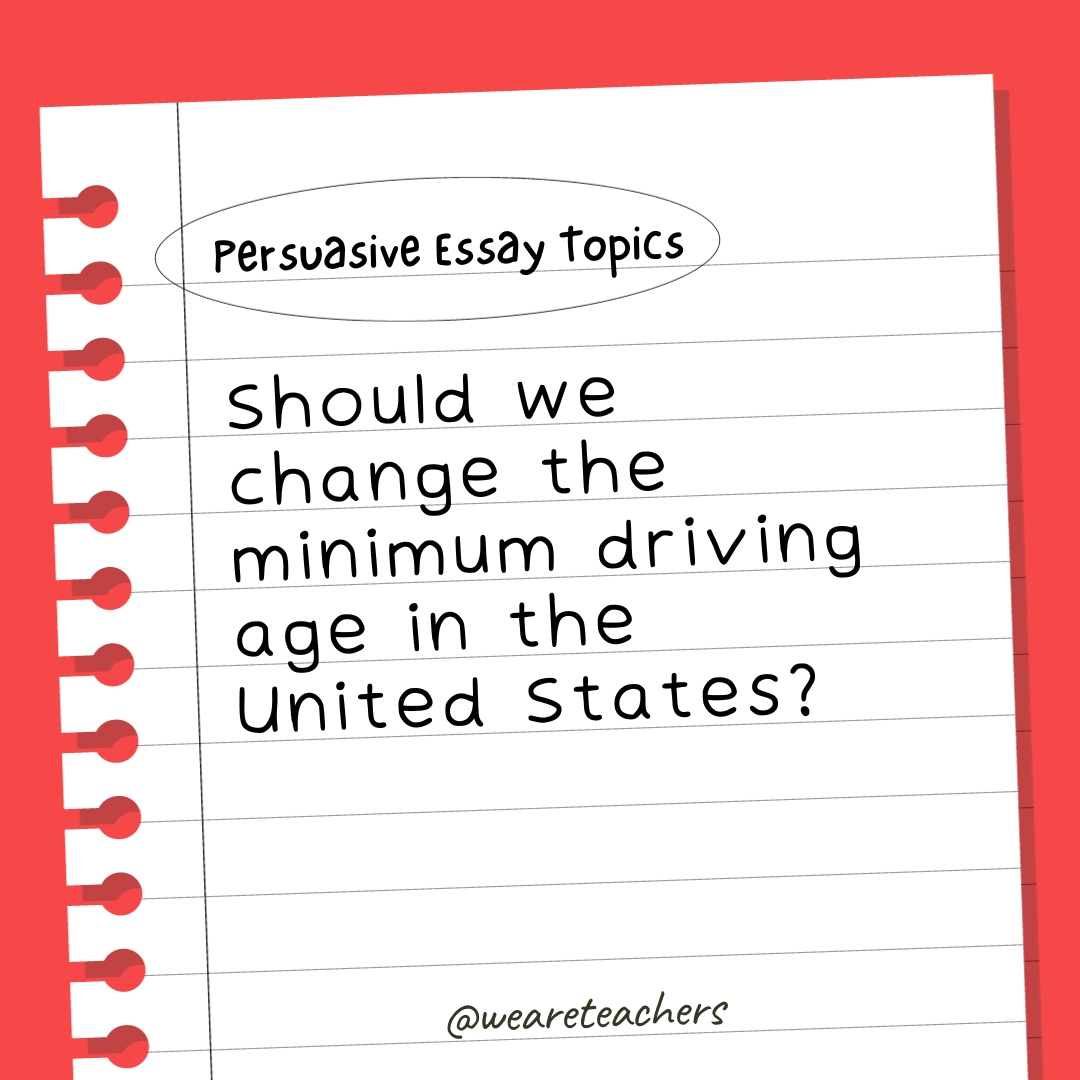
- Which is more important, happiness or success?
- Is democracy the best form of government?
- Is social media helpful or harmful?
- Should parents be punished for their children’s mistakes or crimes?
- Should kids have set bedtimes or just go to bed when they’re sleepy?
- Do you think the government should find a way to provide free health care for everyone?
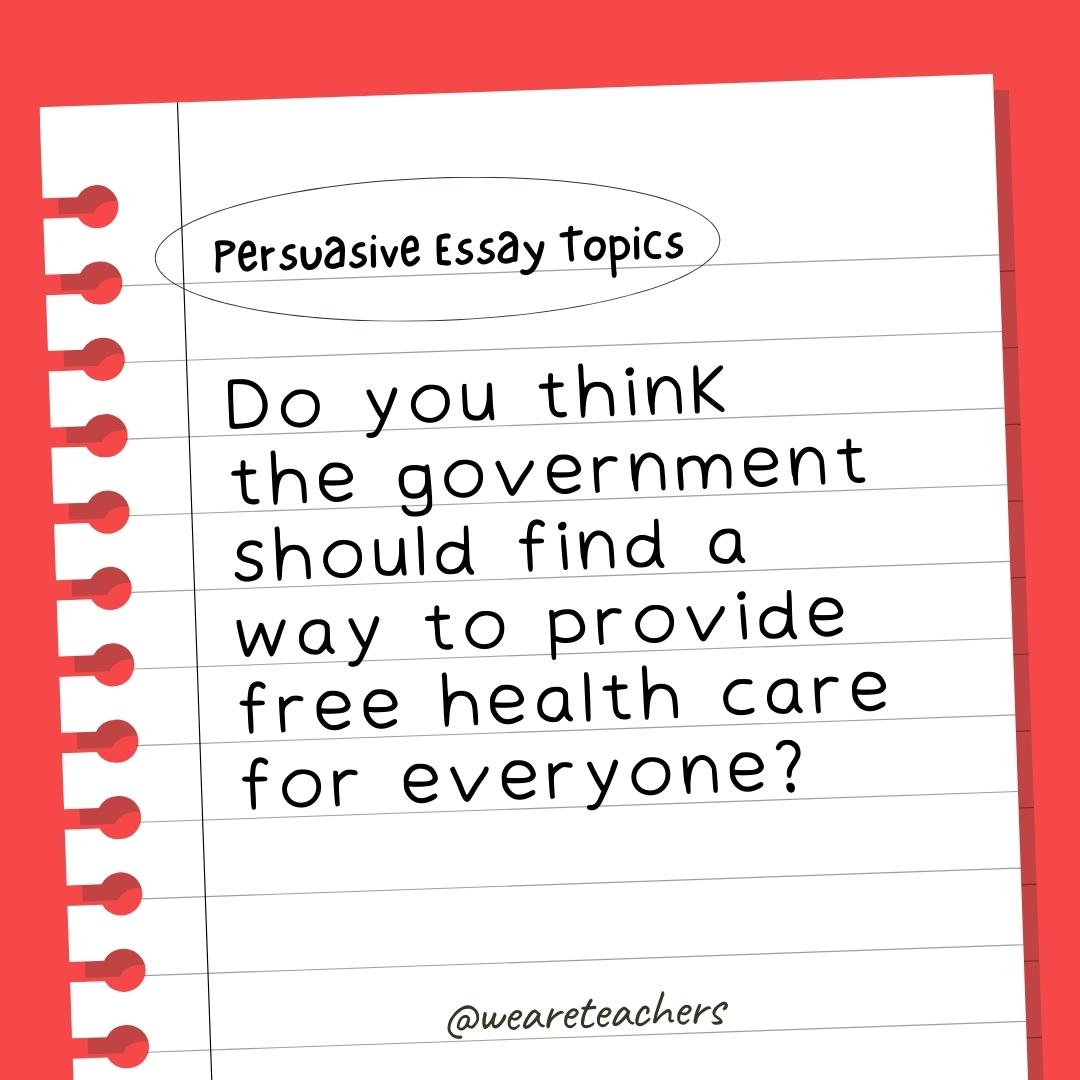
- Is it better to save your allowance or spend it?
- Should we ban plastic bags and bottles?
- Which is better, living in the city or in the country?
- If I could make a new law, it would be …
- Is Pluto a planet?
- Should human cloning be legal?
- Should vaccines be mandatory?
- Is it right for countries to still maintain nuclear weapon arsenals?
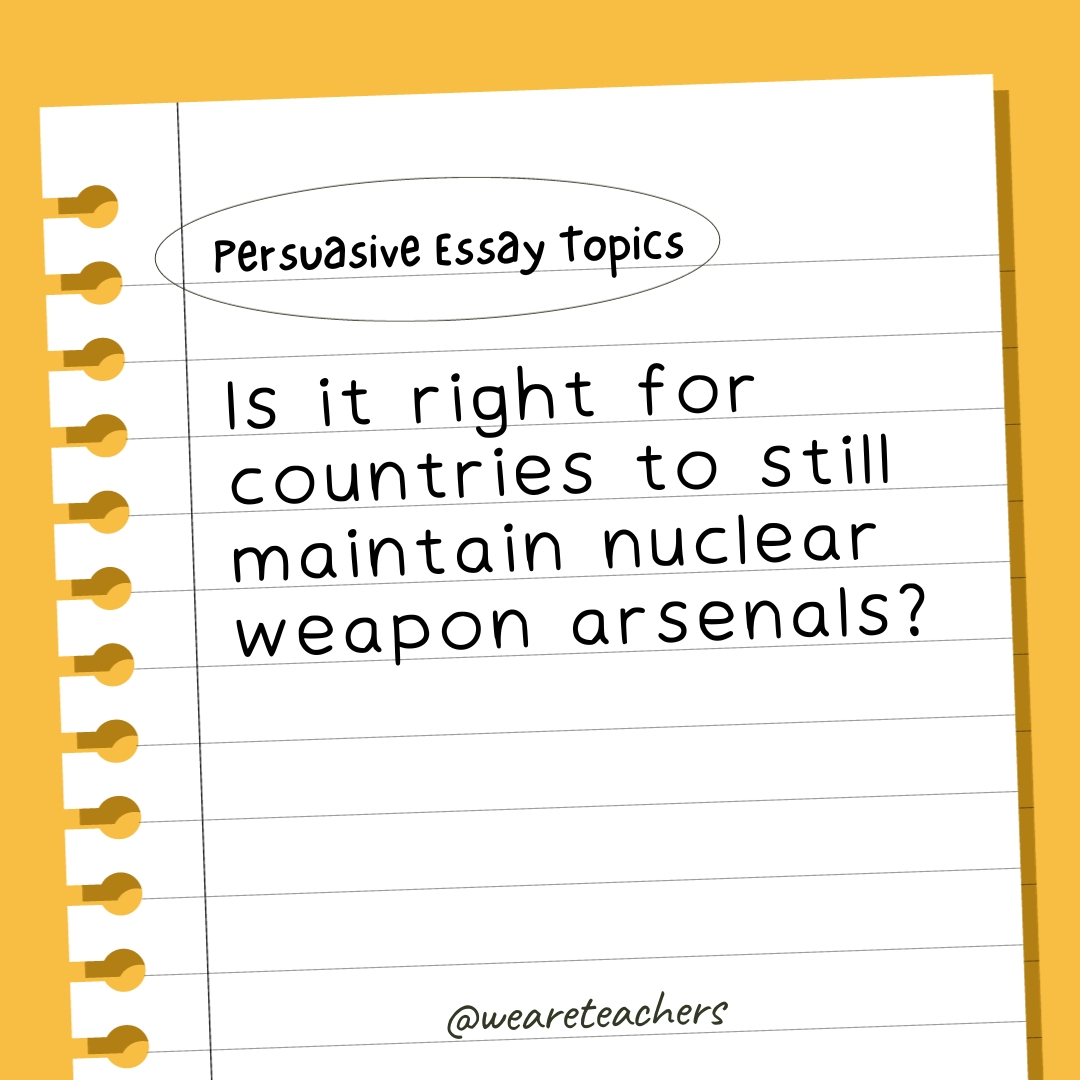
- Should testing on animals be made illegal?
- Will expanded use of artificial intelligence be good for humanity?
- Should all people have free Internet access in their homes?
- Is there intelligent life on other planets?
- Does technology create more jobs than it eliminates?
- Should parents use their children’s cell phones to track where they are?
- Should scientists try to develop a way for people to live forever?
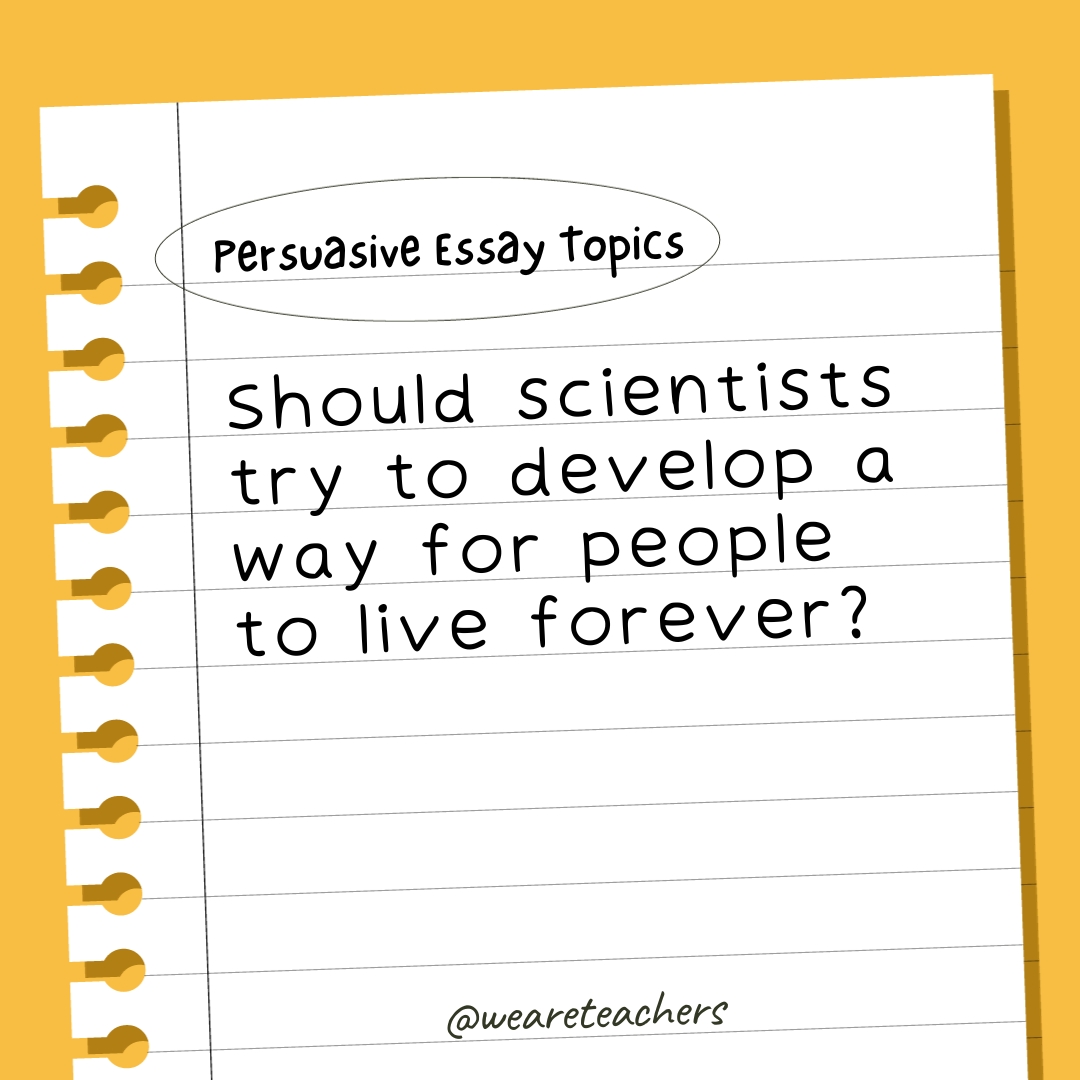
- What’s the best type of smartphone: Android or iPhone?
- Which is better, Macs or PCs?
- Do people rely too much on technology in the modern world?
- Should cryptocurrencies replace cash?
- Should there be a minimum age requirement to own a smartphone?
- Is it important to keep spending money on space exploration, or should we use the money for other things?

- Should kids under 13 be allowed to use social media sites?
- Should we ban cigarette smoking and vaping entirely?
- Is it better to be an animal that lives in the water or on land?
- Should kids be allowed to watch TV on school nights?
- Which is better, paper books or e-books?
- Is the current movie rating system (G, PG, PG-13, etc.) effective?
- Are video games better than board games?
- Should we allow little kids to play competitive sports?
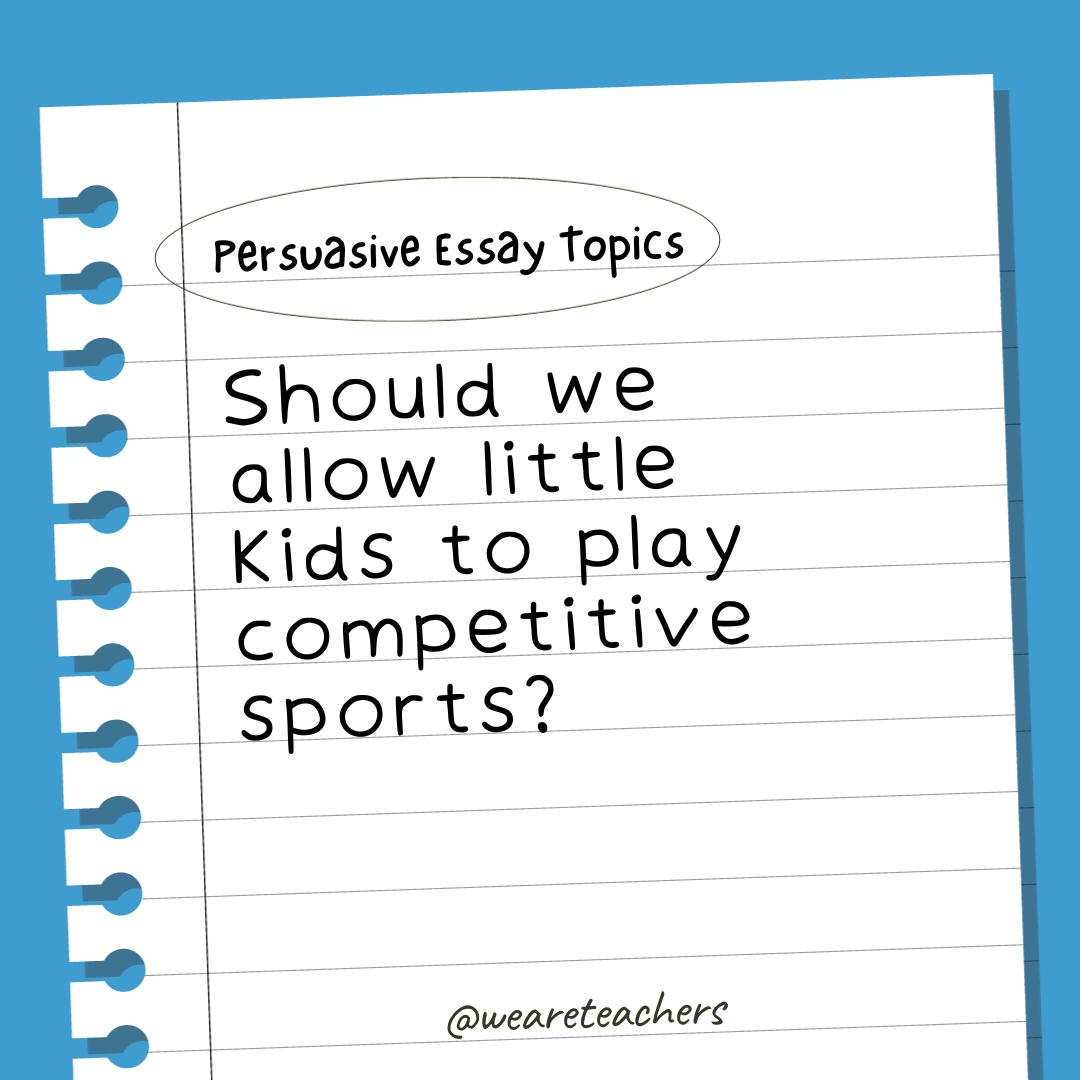
- Which is better, reading books or watching TV?
- Does playing violent video games make people more violent in real life?
- Are graphic novels just as valuable as traditional fictional books?
- Should everyone play on the same sports teams, regardless of gender?
- Choose a book that’s been made into a movie. Which was better, the movie or the book?

- Who is the world’s best athlete, present or past?
- Are professional athletes/musicians/actors overpaid?
- Which is better, fiction or nonfiction?
- The best music genre is …
- What is one book that everyone should read?
- What new sport should be added to the Olympics?
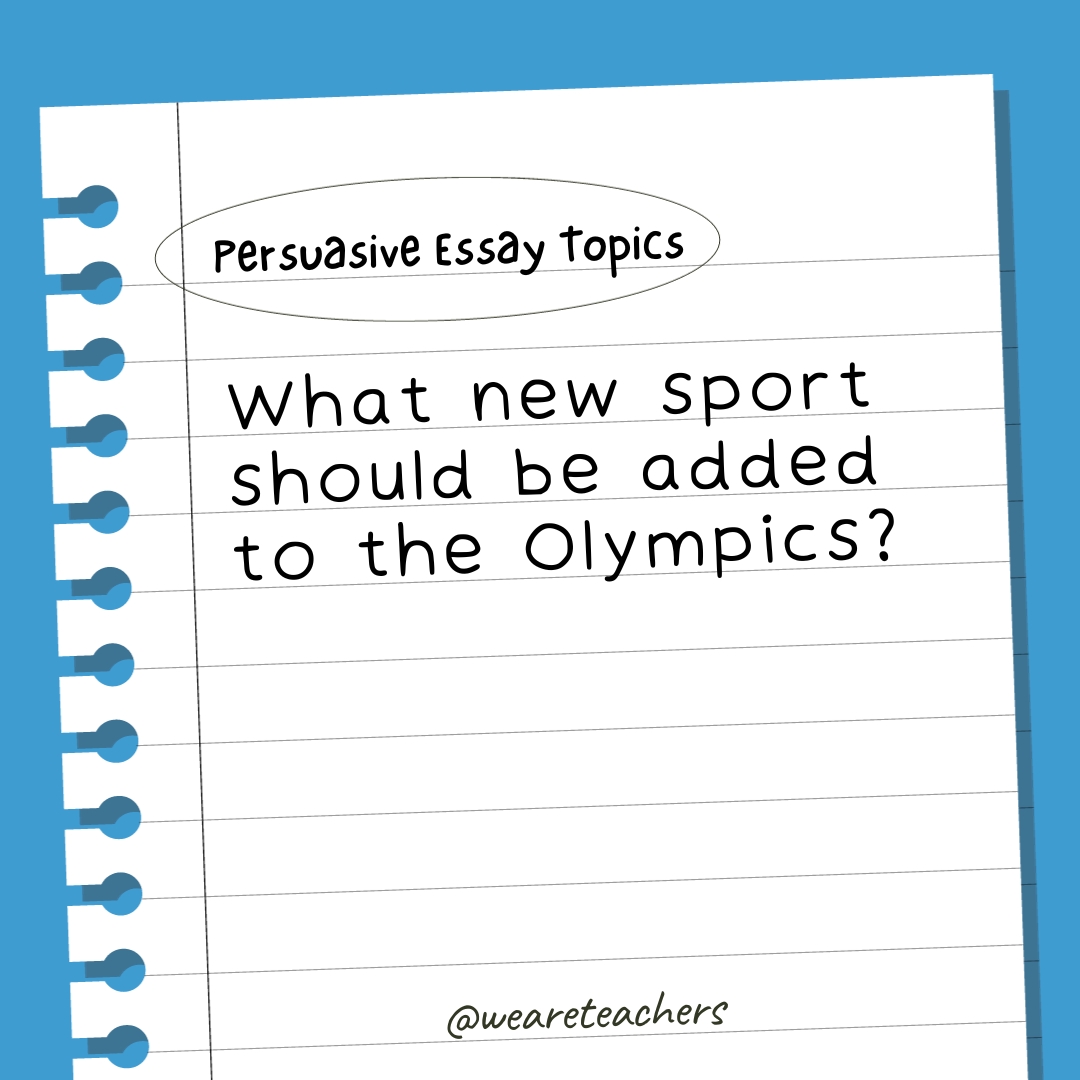
- What’s the best video game system?
- Does playing video games make you smarter?
- Does reality TV actually depict real life?
- Should all neighborhoods have free parks and playgrounds?
- What’s the best holiday?
- The very best food of all time is …
- Which is better, artificial Christmas trees or real ones?
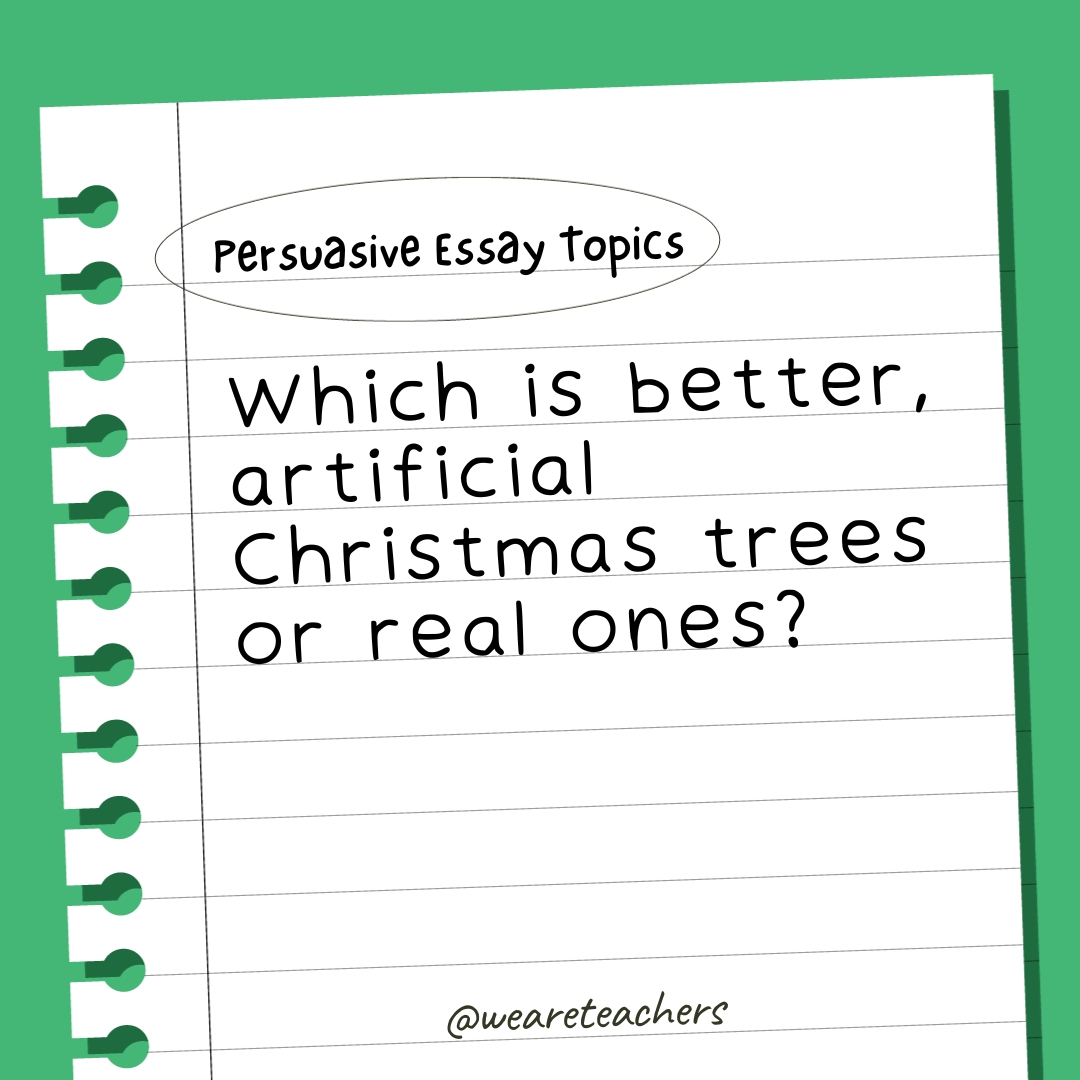
- What’s the best season of the year?
- Should you put ketchup on a hot dog?
- Is a taco a sandwich?
- Does fruit count as dessert?
- Should people have to go to school or work on their birthday?
- Are clowns scary or funny?
- Which is more dangerous, werewolves or vampires?
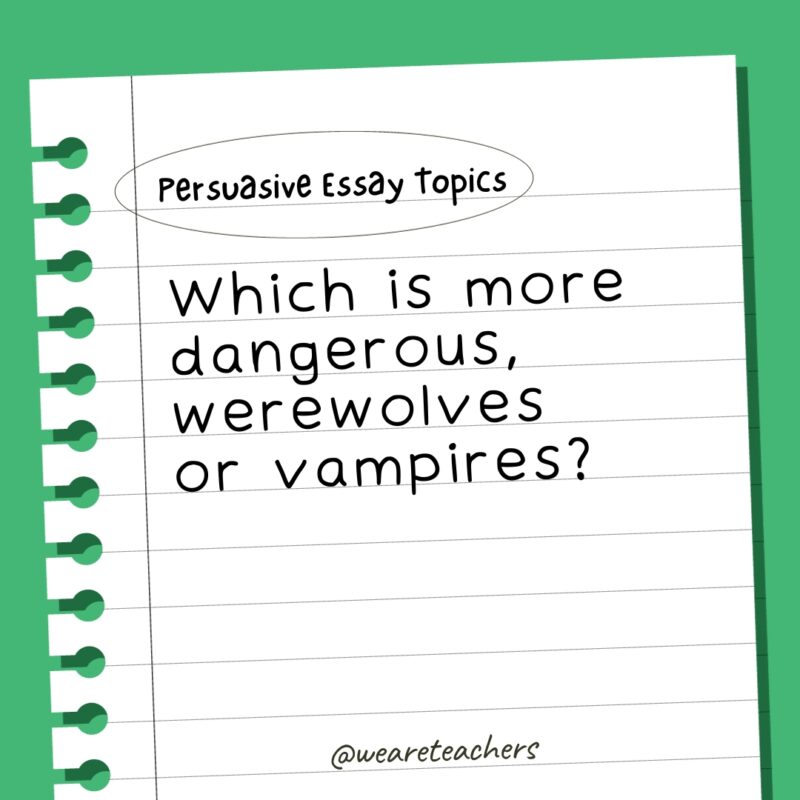
- The best pizza topping is …
- What would be the best superpower to have?
- Should everyone make their bed every day?
- Which came first, the chicken or the egg?
- Should you put pineapple on a pizza?
- Should you eat macaroni and cheese with a spoon or a fork?
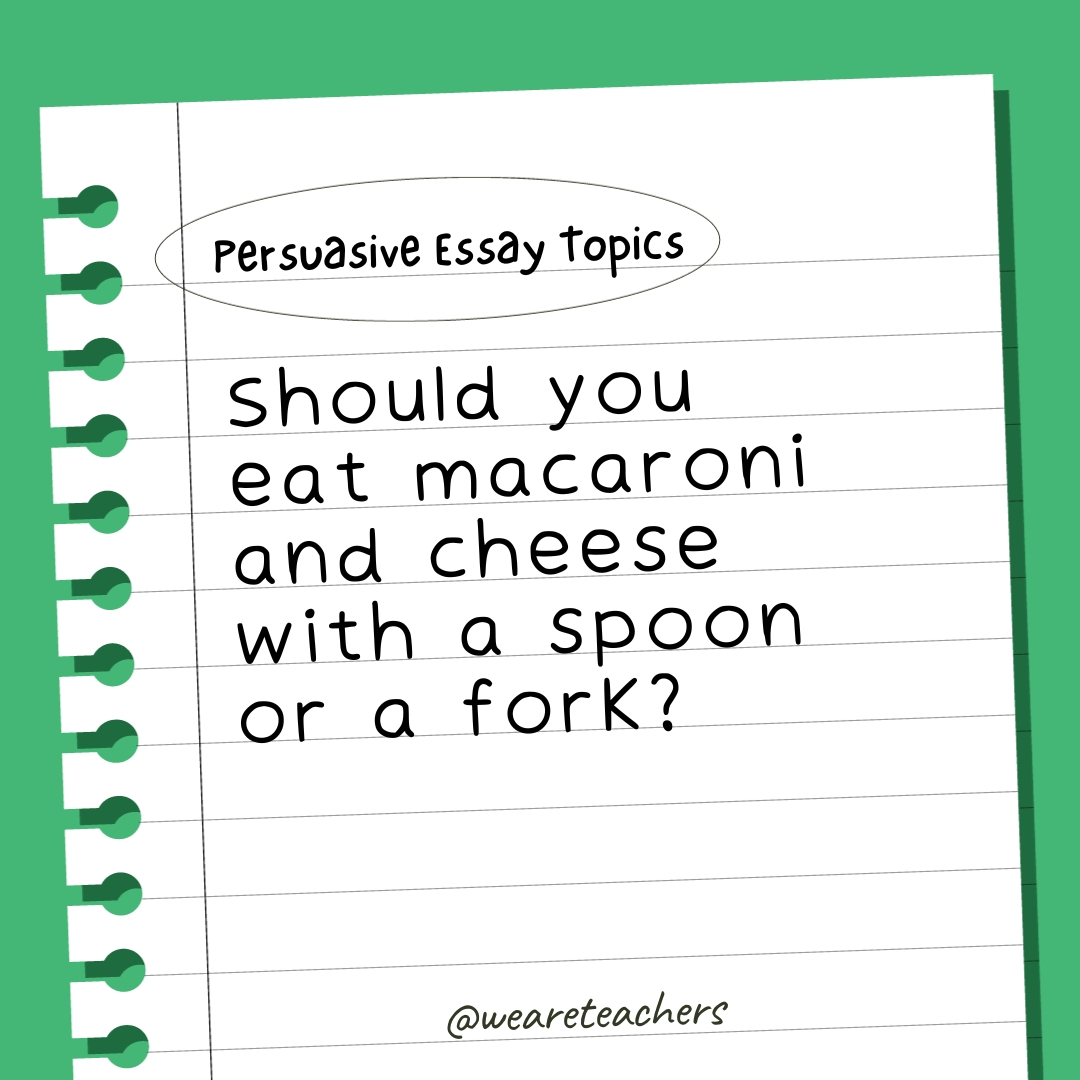
- Describe the world’s best ice cream sundae.
- Is Monday the worst day of the week?
- Would you rather travel back in time or forward in time?
- Is it better to be too hot or too cold?
- Are there aliens living among us here on Earth?
What are your favorite persuasive essay topics for students? Come exchange ideas in the We Are Teachers HELPLINE group on Facebook .
Plus, check out the big list of essay topics for high school (120+ ideas) ..
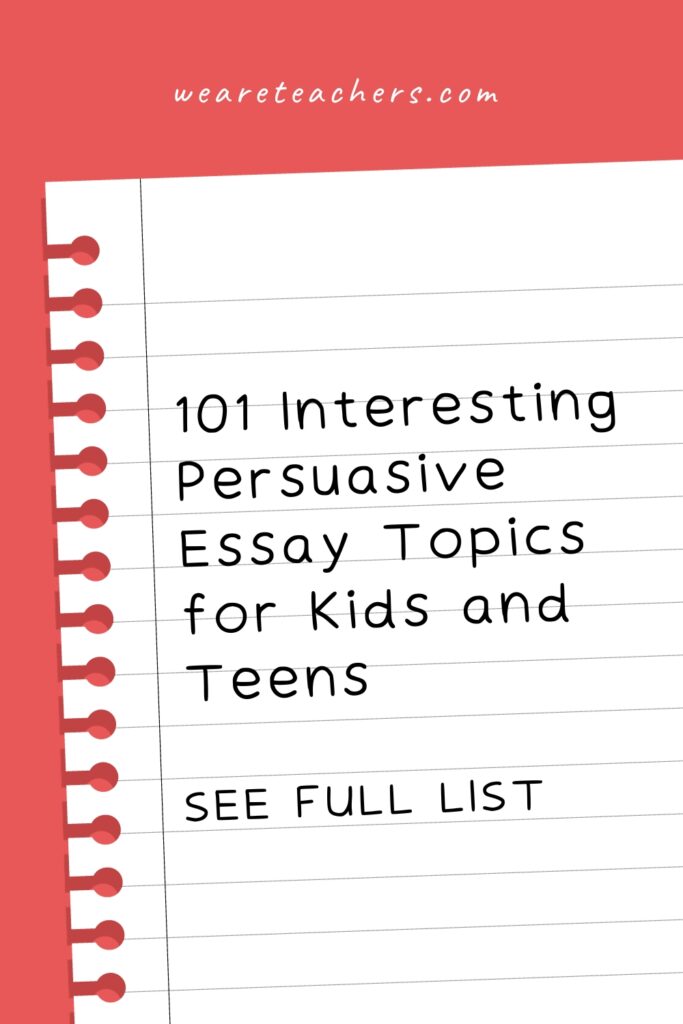
You Might Also Like

To Learn Persuasive Writing, These Students Wrote “Why You Should Adopt Me” Essays for Shelter Pets
The real-world connection made this project so engaging. Continue Reading
Copyright © 2023. All rights reserved. 5335 Gate Parkway, Jacksonville, FL 32256

Choose Your Test
Sat / act prep online guides and tips, how to write an a+ argumentative essay.
Miscellaneous

You'll no doubt have to write a number of argumentative essays in both high school and college, but what, exactly, is an argumentative essay and how do you write the best one possible? Let's take a look.
A great argumentative essay always combines the same basic elements: approaching an argument from a rational perspective, researching sources, supporting your claims using facts rather than opinion, and articulating your reasoning into the most cogent and reasoned points. Argumentative essays are great building blocks for all sorts of research and rhetoric, so your teachers will expect you to master the technique before long.
But if this sounds daunting, never fear! We'll show how an argumentative essay differs from other kinds of papers, how to research and write them, how to pick an argumentative essay topic, and where to find example essays. So let's get started.
What Is an Argumentative Essay? How Is it Different from Other Kinds of Essays?
There are two basic requirements for any and all essays: to state a claim (a thesis statement) and to support that claim with evidence.
Though every essay is founded on these two ideas, there are several different types of essays, differentiated by the style of the writing, how the writer presents the thesis, and the types of evidence used to support the thesis statement.
Essays can be roughly divided into four different types:
#1: Argumentative #2: Persuasive #3: Expository #4: Analytical
So let's look at each type and what the differences are between them before we focus the rest of our time to argumentative essays.
Argumentative Essay
Argumentative essays are what this article is all about, so let's talk about them first.
An argumentative essay attempts to convince a reader to agree with a particular argument (the writer's thesis statement). The writer takes a firm stand one way or another on a topic and then uses hard evidence to support that stance.
An argumentative essay seeks to prove to the reader that one argument —the writer's argument— is the factually and logically correct one. This means that an argumentative essay must use only evidence-based support to back up a claim , rather than emotional or philosophical reasoning (which is often allowed in other types of essays). Thus, an argumentative essay has a burden of substantiated proof and sources , whereas some other types of essays (namely persuasive essays) do not.
You can write an argumentative essay on any topic, so long as there's room for argument. Generally, you can use the same topics for both a persuasive essay or an argumentative one, so long as you support the argumentative essay with hard evidence.
Example topics of an argumentative essay:
- "Should farmers be allowed to shoot wolves if those wolves injure or kill farm animals?"
- "Should the drinking age be lowered in the United States?"
- "Are alternatives to democracy effective and/or feasible to implement?"
The next three types of essays are not argumentative essays, but you may have written them in school. We're going to cover them so you know what not to do for your argumentative essay.
Persuasive Essay
Persuasive essays are similar to argumentative essays, so it can be easy to get them confused. But knowing what makes an argumentative essay different than a persuasive essay can often mean the difference between an excellent grade and an average one.
Persuasive essays seek to persuade a reader to agree with the point of view of the writer, whether that point of view is based on factual evidence or not. The writer has much more flexibility in the evidence they can use, with the ability to use moral, cultural, or opinion-based reasoning as well as factual reasoning to persuade the reader to agree the writer's side of a given issue.
Instead of being forced to use "pure" reason as one would in an argumentative essay, the writer of a persuasive essay can manipulate or appeal to the reader's emotions. So long as the writer attempts to steer the readers into agreeing with the thesis statement, the writer doesn't necessarily need hard evidence in favor of the argument.
Often, you can use the same topics for both a persuasive essay or an argumentative one—the difference is all in the approach and the evidence you present.
Example topics of a persuasive essay:
- "Should children be responsible for their parents' debts?"
- "Should cheating on a test be automatic grounds for expulsion?"
- "How much should sports leagues be held accountable for player injuries and the long-term consequences of those injuries?"
Expository Essay
An expository essay is typically a short essay in which the writer explains an idea, issue, or theme , or discusses the history of a person, place, or idea.
This is typically a fact-forward essay with little argument or opinion one way or the other.
Example topics of an expository essay:
- "The History of the Philadelphia Liberty Bell"
- "The Reasons I Always Wanted to be a Doctor"
- "The Meaning Behind the Colloquialism ‘People in Glass Houses Shouldn't Throw Stones'"
Analytical Essay
An analytical essay seeks to delve into the deeper meaning of a text or work of art, or unpack a complicated idea . These kinds of essays closely interpret a source and look into its meaning by analyzing it at both a macro and micro level.
This type of analysis can be augmented by historical context or other expert or widely-regarded opinions on the subject, but is mainly supported directly through the original source (the piece or art or text being analyzed) .
Example topics of an analytical essay:
- "Victory Gin in Place of Water: The Symbolism Behind Gin as the Only Potable Substance in George Orwell's 1984"
- "Amarna Period Art: The Meaning Behind the Shift from Rigid to Fluid Poses"
- "Adultery During WWII, as Told Through a Series of Letters to and from Soldiers"

There are many different types of essay and, over time, you'll be able to master them all.
A Typical Argumentative Essay Assignment
The average argumentative essay is between three to five pages, and will require at least three or four separate sources with which to back your claims . As for the essay topic , you'll most often be asked to write an argumentative essay in an English class on a "general" topic of your choice, ranging the gamut from science, to history, to literature.
But while the topics of an argumentative essay can span several different fields, the structure of an argumentative essay is always the same: you must support a claim—a claim that can reasonably have multiple sides—using multiple sources and using a standard essay format (which we'll talk about later on).
This is why many argumentative essay topics begin with the word "should," as in:
- "Should all students be required to learn chemistry in high school?"
- "Should children be required to learn a second language?"
- "Should schools or governments be allowed to ban books?"
These topics all have at least two sides of the argument: Yes or no. And you must support the side you choose with evidence as to why your side is the correct one.
But there are also plenty of other ways to frame an argumentative essay as well:
- "Does using social media do more to benefit or harm people?"
- "Does the legal status of artwork or its creators—graffiti and vandalism, pirated media, a creator who's in jail—have an impact on the art itself?"
- "Is or should anyone ever be ‘above the law?'"
Though these are worded differently than the first three, you're still essentially forced to pick between two sides of an issue: yes or no, for or against, benefit or detriment. Though your argument might not fall entirely into one side of the divide or another—for instance, you could claim that social media has positively impacted some aspects of modern life while being a detriment to others—your essay should still support one side of the argument above all. Your final stance would be that overall , social media is beneficial or overall , social media is harmful.
If your argument is one that is mostly text-based or backed by a single source (e.g., "How does Salinger show that Holden Caulfield is an unreliable narrator?" or "Does Gatsby personify the American Dream?"), then it's an analytical essay, rather than an argumentative essay. An argumentative essay will always be focused on more general topics so that you can use multiple sources to back up your claims.
Good Argumentative Essay Topics
So you know the basic idea behind an argumentative essay, but what topic should you write about?
Again, almost always, you'll be asked to write an argumentative essay on a free topic of your choice, or you'll be asked to select between a few given topics . If you're given complete free reign of topics, then it'll be up to you to find an essay topic that no only appeals to you, but that you can turn into an A+ argumentative essay.
What makes a "good" argumentative essay topic depends on both the subject matter and your personal interest —it can be hard to give your best effort on something that bores you to tears! But it can also be near impossible to write an argumentative essay on a topic that has no room for debate.
As we said earlier, a good argumentative essay topic will be one that has the potential to reasonably go in at least two directions—for or against, yes or no, and why . For example, it's pretty hard to write an argumentative essay on whether or not people should be allowed to murder one another—not a whole lot of debate there for most people!—but writing an essay for or against the death penalty has a lot more wiggle room for evidence and argument.
A good topic is also one that can be substantiated through hard evidence and relevant sources . So be sure to pick a topic that other people have studied (or at least studied elements of) so that you can use their data in your argument. For example, if you're arguing that it should be mandatory for all middle school children to play a sport, you might have to apply smaller scientific data points to the larger picture you're trying to justify. There are probably several studies you could cite on the benefits of physical activity and the positive effect structure and teamwork has on young minds, but there's probably no study you could use where a group of scientists put all middle-schoolers in one jurisdiction into a mandatory sports program (since that's probably never happened). So long as your evidence is relevant to your point and you can extrapolate from it to form a larger whole, you can use it as a part of your resource material.
And if you need ideas on where to get started, or just want to see sample argumentative essay topics, then check out these links for hundreds of potential argumentative essay topics.
101 Persuasive (or Argumentative) Essay and Speech Topics
301 Prompts for Argumentative Writing
Top 50 Ideas for Argumentative/Persuasive Essay Writing
[Note: some of these say "persuasive essay topics," but just remember that the same topic can often be used for both a persuasive essay and an argumentative essay; the difference is in your writing style and the evidence you use to support your claims.]

KO! Find that one argumentative essay topic you can absolutely conquer.
Argumentative Essay Format
Argumentative Essays are composed of four main elements:
- A position (your argument)
- Your reasons
- Supporting evidence for those reasons (from reliable sources)
- Counterargument(s) (possible opposing arguments and reasons why those arguments are incorrect)
If you're familiar with essay writing in general, then you're also probably familiar with the five paragraph essay structure . This structure is a simple tool to show how one outlines an essay and breaks it down into its component parts, although it can be expanded into as many paragraphs as you want beyond the core five.
The standard argumentative essay is often 3-5 pages, which will usually mean a lot more than five paragraphs, but your overall structure will look the same as a much shorter essay.
An argumentative essay at its simplest structure will look like:
Paragraph 1: Intro
- Set up the story/problem/issue
- Thesis/claim
Paragraph 2: Support
- Reason #1 claim is correct
- Supporting evidence with sources
Paragraph 3: Support
- Reason #2 claim is correct
Paragraph 4: Counterargument
- Explanation of argument for the other side
- Refutation of opposing argument with supporting evidence
Paragraph 5: Conclusion
- Re-state claim
- Sum up reasons and support of claim from the essay to prove claim is correct
Now let's unpack each of these paragraph types to see how they work (with examples!), what goes into them, and why.
Paragraph 1—Set Up and Claim
Your first task is to introduce the reader to the topic at hand so they'll be prepared for your claim. Give a little background information, set the scene, and give the reader some stakes so that they care about the issue you're going to discuss.
Next, you absolutely must have a position on an argument and make that position clear to the readers. It's not an argumentative essay unless you're arguing for a specific claim, and this claim will be your thesis statement.
Your thesis CANNOT be a mere statement of fact (e.g., "Washington DC is the capital of the United States"). Your thesis must instead be an opinion which can be backed up with evidence and has the potential to be argued against (e.g., "New York should be the capital of the United States").
Paragraphs 2 and 3—Your Evidence
These are your body paragraphs in which you give the reasons why your argument is the best one and back up this reasoning with concrete evidence .
The argument supporting the thesis of an argumentative essay should be one that can be supported by facts and evidence, rather than personal opinion or cultural or religious mores.
For example, if you're arguing that New York should be the new capital of the US, you would have to back up that fact by discussing the factual contrasts between New York and DC in terms of location, population, revenue, and laws. You would then have to talk about the precedents for what makes for a good capital city and why New York fits the bill more than DC does.
Your argument can't simply be that a lot of people think New York is the best city ever and that you agree.
In addition to using concrete evidence, you always want to keep the tone of your essay passionate, but impersonal . Even though you're writing your argument from a single opinion, don't use first person language—"I think," "I feel," "I believe,"—to present your claims. Doing so is repetitive, since by writing the essay you're already telling the audience what you feel, and using first person language weakens your writing voice.
For example,
"I think that Washington DC is no longer suited to be the capital city of the United States."
"Washington DC is no longer suited to be the capital city of the United States."
The second statement sounds far stronger and more analytical.
Paragraph 4—Argument for the Other Side and Refutation
Even without a counter argument, you can make a pretty persuasive claim, but a counterargument will round out your essay into one that is much more persuasive and substantial.
By anticipating an argument against your claim and taking the initiative to counter it, you're allowing yourself to get ahead of the game. This way, you show that you've given great thought to all sides of the issue before choosing your position, and you demonstrate in multiple ways how yours is the more reasoned and supported side.
Paragraph 5—Conclusion
This paragraph is where you re-state your argument and summarize why it's the best claim.
Briefly touch on your supporting evidence and voila! A finished argumentative essay.

Your essay should have just as awesome a skeleton as this plesiosaur does. (In other words: a ridiculously awesome skeleton)
Argumentative Essay Example: 5-Paragraph Style
It always helps to have an example to learn from. I've written a full 5-paragraph argumentative essay here. Look at how I state my thesis in paragraph 1, give supporting evidence in paragraphs 2 and 3, address a counterargument in paragraph 4, and conclude in paragraph 5.
Topic: Is it possible to maintain conflicting loyalties?
Paragraph 1
It is almost impossible to go through life without encountering a situation where your loyalties to different people or causes come into conflict with each other. Maybe you have a loving relationship with your sister, but she disagrees with your decision to join the army, or you find yourself torn between your cultural beliefs and your scientific ones. These conflicting loyalties can often be maintained for a time, but as examples from both history and psychological theory illustrate, sooner or later, people have to make a choice between competing loyalties, as no one can maintain a conflicting loyalty or belief system forever.
The first two sentences set the scene and give some hypothetical examples and stakes for the reader to care about.
The third sentence finishes off the intro with the thesis statement, making very clear how the author stands on the issue ("people have to make a choice between competing loyalties, as no one can maintain a conflicting loyalty or belief system forever." )
Paragraphs 2 and 3
Psychological theory states that human beings are not equipped to maintain conflicting loyalties indefinitely and that attempting to do so leads to a state called "cognitive dissonance." Cognitive dissonance theory is the psychological idea that people undergo tremendous mental stress or anxiety when holding contradictory beliefs, values, or loyalties (Festinger, 1957). Even if human beings initially hold a conflicting loyalty, they will do their best to find a mental equilibrium by making a choice between those loyalties—stay stalwart to a belief system or change their beliefs. One of the earliest formal examples of cognitive dissonance theory comes from Leon Festinger's When Prophesy Fails . Members of an apocalyptic cult are told that the end of the world will occur on a specific date and that they alone will be spared the Earth's destruction. When that day comes and goes with no apocalypse, the cult members face a cognitive dissonance between what they see and what they've been led to believe (Festinger, 1956). Some choose to believe that the cult's beliefs are still correct, but that the Earth was simply spared from destruction by mercy, while others choose to believe that they were lied to and that the cult was fraudulent all along. Both beliefs cannot be correct at the same time, and so the cult members are forced to make their choice.
But even when conflicting loyalties can lead to potentially physical, rather than just mental, consequences, people will always make a choice to fall on one side or other of a dividing line. Take, for instance, Nicolaus Copernicus, a man born and raised in Catholic Poland (and educated in Catholic Italy). Though the Catholic church dictated specific scientific teachings, Copernicus' loyalty to his own observations and scientific evidence won out over his loyalty to his country's government and belief system. When he published his heliocentric model of the solar system--in opposition to the geocentric model that had been widely accepted for hundreds of years (Hannam, 2011)-- Copernicus was making a choice between his loyalties. In an attempt t o maintain his fealty both to the established system and to what he believed, h e sat on his findings for a number of years (Fantoli, 1994). But, ultimately, Copernicus made the choice to side with his beliefs and observations above all and published his work for the world to see (even though, in doing so, he risked both his reputation and personal freedoms).
These two paragraphs provide the reasons why the author supports the main argument and uses substantiated sources to back those reasons.
The paragraph on cognitive dissonance theory gives both broad supporting evidence and more narrow, detailed supporting evidence to show why the thesis statement is correct not just anecdotally but also scientifically and psychologically. First, we see why people in general have a difficult time accepting conflicting loyalties and desires and then how this applies to individuals through the example of the cult members from the Dr. Festinger's research.
The next paragraph continues to use more detailed examples from history to provide further evidence of why the thesis that people cannot indefinitely maintain conflicting loyalties is true.
Paragraph 4
Some will claim that it is possible to maintain conflicting beliefs or loyalties permanently, but this is often more a matter of people deluding themselves and still making a choice for one side or the other, rather than truly maintaining loyalty to both sides equally. For example, Lancelot du Lac typifies a person who claims to maintain a balanced loyalty between to two parties, but his attempt to do so fails (as all attempts to permanently maintain conflicting loyalties must). Lancelot tells himself and others that he is equally devoted to both King Arthur and his court and to being Queen Guinevere's knight (Malory, 2008). But he can neither be in two places at once to protect both the king and queen, nor can he help but let his romantic feelings for the queen to interfere with his duties to the king and the kingdom. Ultimately, he and Queen Guinevere give into their feelings for one another and Lancelot—though he denies it—chooses his loyalty to her over his loyalty to Arthur. This decision plunges the kingdom into a civil war, ages Lancelot prematurely, and ultimately leads to Camelot's ruin (Raabe, 1987). Though Lancelot claimed to have been loyal to both the king and the queen, this loyalty was ultimately in conflict, and he could not maintain it.
Here we have the acknowledgement of a potential counter-argument and the evidence as to why it isn't true.
The argument is that some people (or literary characters) have asserted that they give equal weight to their conflicting loyalties. The refutation is that, though some may claim to be able to maintain conflicting loyalties, they're either lying to others or deceiving themselves. The paragraph shows why this is true by providing an example of this in action.
Paragraph 5
Whether it be through literature or history, time and time again, people demonstrate the challenges of trying to manage conflicting loyalties and the inevitable consequences of doing so. Though belief systems are malleable and will often change over time, it is not possible to maintain two mutually exclusive loyalties or beliefs at once. In the end, people always make a choice, and loyalty for one party or one side of an issue will always trump loyalty to the other.
The concluding paragraph summarizes the essay, touches on the evidence presented, and re-states the thesis statement.
How to Write an Argumentative Essay: 8 Steps
Writing the best argumentative essay is all about the preparation, so let's talk steps:
#1: Preliminary Research
If you have the option to pick your own argumentative essay topic (which you most likely will), then choose one or two topics you find the most intriguing or that you have a vested interest in and do some preliminary research on both sides of the debate.
Do an open internet search just to see what the general chatter is on the topic and what the research trends are.
Did your preliminary reading influence you to pick a side or change your side? Without diving into all the scholarly articles at length, do you believe there's enough evidence to support your claim? Have there been scientific studies? Experiments? Does a noted scholar in the field agree with you? If not, you may need to pick another topic or side of the argument to support.
#2: Pick Your Side and Form Your Thesis
Now's the time to pick the side of the argument you feel you can support the best and summarize your main point into your thesis statement.
Your thesis will be the basis of your entire essay, so make sure you know which side you're on, that you've stated it clearly, and that you stick by your argument throughout the entire essay .
#3: Heavy-Duty Research Time
You've taken a gander at what the internet at large has to say on your argument, but now's the time to actually read those sources and take notes.
Check scholarly journals online at Google Scholar , the Directory of Open Access Journals , or JStor . You can also search individual university or school libraries and websites to see what kinds of academic articles you can access for free. Keep track of your important quotes and page numbers and put them somewhere that's easy to find later.
And don't forget to check your school or local libraries as well!
#4: Outline
Follow the five-paragraph outline structure from the previous section.
Fill in your topic, your reasons, and your supporting evidence into each of the categories.
Before you begin to flesh out the essay, take a look at what you've got. Is your thesis statement in the first paragraph? Is it clear? Is your argument logical? Does your supporting evidence support your reasoning?
By outlining your essay, you streamline your process and take care of any logic gaps before you dive headfirst into the writing. This will save you a lot of grief later on if you need to change your sources or your structure, so don't get too trigger-happy and skip this step.
Now that you've laid out exactly what you'll need for your essay and where, it's time to fill in all the gaps by writing it out.
Take it one step at a time and expand your ideas into complete sentences and substantiated claims. It may feel daunting to turn an outline into a complete draft, but just remember that you've already laid out all the groundwork; now you're just filling in the gaps.
If you have the time before deadline, give yourself a day or two (or even just an hour!) away from your essay . Looking it over with fresh eyes will allow you to see errors, both minor and major, that you likely would have missed had you tried to edit when it was still raw.
Take a first pass over the entire essay and try your best to ignore any minor spelling or grammar mistakes—you're just looking at the big picture right now. Does it make sense as a whole? Did the essay succeed in making an argument and backing that argument up logically? (Do you feel persuaded?)
If not, go back and make notes so that you can fix it for your final draft.
Once you've made your revisions to the overall structure, mark all your small errors and grammar problems so you can fix them in the next draft.
#7: Final Draft
Use the notes you made on the rough draft and go in and hack and smooth away until you're satisfied with the final result.
A checklist for your final draft:
- Formatting is correct according to your teacher's standards
- No errors in spelling, grammar, and punctuation
- Essay is the right length and size for the assignment
- The argument is present, consistent, and concise
- Each reason is supported by relevant evidence
- The essay makes sense overall
#8: Celebrate!
Once you've brought that final draft to a perfect polish and turned in your assignment, you're done! Go you!

Be prepared and ♪ you'll never go hungry again ♪, *cough*, or struggle with your argumentative essay-writing again. (Walt Disney Studios)
Good Examples of Argumentative Essays Online
Theory is all well and good, but examples are key. Just to get you started on what a fully-fleshed out argumentative essay looks like, let's see some examples in action.
Check out these two argumentative essay examples on the use of landmines and freons (and note the excellent use of concrete sources to back up their arguments!).
The Use of Landmines
A Shattered Sky
The Take-Aways: Keys to Writing an Argumentative Essay
At first, writing an argumentative essay may seem like a monstrous hurdle to overcome, but with the proper preparation and understanding, you'll be able to knock yours out of the park.
Remember the differences between a persuasive essay and an argumentative one, make sure your thesis is clear, and double-check that your supporting evidence is both relevant to your point and well-sourced . Pick your topic, do your research, make your outline, and fill in the gaps. Before you know it, you'll have yourself an A+ argumentative essay there, my friend.
What's Next?
Now you know the ins and outs of an argumentative essay, but how comfortable are you writing in other styles? Learn more about the four writing styles and when it makes sense to use each .
Understand how to make an argument, but still having trouble organizing your thoughts? Check out our guide to three popular essay formats and choose which one is right for you.
Ready to make your case, but not sure what to write about? We've created a list of 50 potential argumentative essay topics to spark your imagination.
Need more help with this topic? Check out Tutorbase!
Our vetted tutor database includes a range of experienced educators who can help you polish an essay for English or explain how derivatives work for Calculus. You can use dozens of filters and search criteria to find the perfect person for your needs.

Courtney scored in the 99th percentile on the SAT in high school and went on to graduate from Stanford University with a degree in Cultural and Social Anthropology. She is passionate about bringing education and the tools to succeed to students from all backgrounds and walks of life, as she believes open education is one of the great societal equalizers. She has years of tutoring experience and writes creative works in her free time.
Student and Parent Forum
Our new student and parent forum, at ExpertHub.PrepScholar.com , allow you to interact with your peers and the PrepScholar staff. See how other students and parents are navigating high school, college, and the college admissions process. Ask questions; get answers.

Ask a Question Below
Have any questions about this article or other topics? Ask below and we'll reply!
Improve With Our Famous Guides
- For All Students
The 5 Strategies You Must Be Using to Improve 160+ SAT Points
How to Get a Perfect 1600, by a Perfect Scorer
Series: How to Get 800 on Each SAT Section:
Score 800 on SAT Math
Score 800 on SAT Reading
Score 800 on SAT Writing
Series: How to Get to 600 on Each SAT Section:
Score 600 on SAT Math
Score 600 on SAT Reading
Score 600 on SAT Writing
Free Complete Official SAT Practice Tests
What SAT Target Score Should You Be Aiming For?
15 Strategies to Improve Your SAT Essay
The 5 Strategies You Must Be Using to Improve 4+ ACT Points
How to Get a Perfect 36 ACT, by a Perfect Scorer
Series: How to Get 36 on Each ACT Section:
36 on ACT English
36 on ACT Math
36 on ACT Reading
36 on ACT Science
Series: How to Get to 24 on Each ACT Section:
24 on ACT English
24 on ACT Math
24 on ACT Reading
24 on ACT Science
What ACT target score should you be aiming for?
ACT Vocabulary You Must Know
ACT Writing: 15 Tips to Raise Your Essay Score
How to Get Into Harvard and the Ivy League
How to Get a Perfect 4.0 GPA
How to Write an Amazing College Essay
What Exactly Are Colleges Looking For?
Is the ACT easier than the SAT? A Comprehensive Guide
Should you retake your SAT or ACT?
When should you take the SAT or ACT?
Stay Informed
Get the latest articles and test prep tips!
Looking for Graduate School Test Prep?
Check out our top-rated graduate blogs here:
GRE Online Prep Blog
GMAT Online Prep Blog
TOEFL Online Prep Blog
Holly R. "I am absolutely overjoyed and cannot thank you enough for helping me!”
Argumentative Essay Writing
Argumentative Essay Examples

Best Argumentative Essay Examples for Your Help
Published on: Mar 10, 2023
Last updated on: Jan 30, 2024

People also read
Argumentative Essay - A Complete Writing Guide
Learn How to Write an Argumentative Essay Outline
Basic Types of Argument and How to Use Them?
Take Your Pick – 200+ Argumentative Essay Topics
Essential Tips and Examples for Writing an Engaging Argumentative Essay about Abortion
Crafting a Winning Argumentative Essay on Social Media
Craft a Winning Argumentative Essay about Mental Health
Strategies for Writing a Winning Argumentative Essay about Technology
Crafting an Unbeatable Argumentative Essay About Gun Control
Win the Debate - Writing An Effective Argumentative Essay About Sports
Make Your Case: A Guide to Writing an Argumentative Essay on Climate Change
Ready, Set, Argue: Craft a Convincing Argumentative Essay About Wearing Mask
Crafting a Powerful Argumentative Essay about Global Warming: A Step-by-Step Guide
Share this article
Argumentative essays are one of the most common types of essay writing. Students are assigned to write such essays very frequently.
Despite being assigned so frequently, students still find it hard to write a good argumentative essay .
There are certain things that one needs to follow to write a good argumentative essay. The first thing is to choose an effective and interesting topic. Use all possible sources to dig out the best topic.
Afterward, the student should choose the model that they would follow to write this type of essay. Follow the steps of the chosen model and start writing the essay.
The models for writing an argumentative essay are the classical model, the Rogerian model, and the Toulmin model.
To make sure that you write a good argumentative essay, read the different types of examples mentioned in this blog.
On This Page On This Page -->
Good Argumentative Essay Examples
Argumentative essays are an inevitable part of academic life. To write a good argumentative essay, you need to see a few good examples of this type of essay.
To analyze whether the example is good to take help from or not. You need to look for a few things in it.
Make sure it follows one specific model and has an introductory paragraph, organized body paragraphs, and a formal conclusion.

Get More Examples From Our AI Essay Writer
How to Start an Argumentative Essay Example
Learning how to start an argumentative essay example is a tricky thing for beginners. It is quite simple but can be challenging for newbies. To start an argumentative essay example, you need to write a brief and attractive introduction. It is written to convince the reader and make them understand your point of view .
Add body paragraphs after the introduction to support your thesis statement. Also, use body paragraphs to highlight the strengths and weaknesses of your side of the argument.
Write a formal conclusion for your essay and summarize all the key elements of your essay. Look at the example mentioned below to understand the concept more clearly.
Check out this video for more information!
Argumentative Essay Example (PDF)
Argumentative Essay Example
Argumentative essays are assigned to university students more often than the students of schools and colleges.
It involves arguments over vast and sometimes bold topics as well.
For university students, usually, argumentative essay topics are not provided. They are required to search for the topic themselves and write accordingly.
The following examples will give an idea of how university students write argumentative essays.
Argumentative Essay Example for University (PDF)
Argumentative Essay Examples for College
For the college level, it is recommended to use simple language and avoid the use of complex words in essays.
Make sure that using simple language and valid evidence, you support your claim well and make it as convincing as possible
If you are a college student and want to write an argumentative essay, read the examples provided below. Focus on the formatting and the vocabulary used.
Argumentative Essay Example for College (PDF)
College Argumentative Essay Sample (PDF)
Argumentative Essay Examples for Middle School
Being a middle school student, you must be wondering how we write an argumentative essay. And how can you support your argument?
Go through the following examples and hopefully, you will be able to write an effective argumentative essay very easily.
Argumentative Essay Example for Middle School(PDF)
Middle School Argumentative Essay Sample (PDF)
Argumentative Essay Examples for High School
High school students are not very aware of all the skills that are needed to write research papers and essays.
Especially, when it comes to argumentative essays, it becomes quite a challenge for high schools to defend their argument
In this scenario, the best option is to look into some good examples. Here we have summed up two best examples of argumentative essays for high school students specifically.
Argumentative Essay Example for High School (PDF)
High School Argumentative Essay Sample (PDF)
Argumentative Essay Examples for O Level
The course outline for O levels is quite tough. O levels students need to have a good command of the English language and amazing writing skills.
If you are an O-level student, the following examples will guide you on how to write an argumentative essay.
Argumentative Essay Example for O Level (PDF)
Argumentative Essay for O Level Students (PDF)
5-Paragraph Argumentative Essay Examples
A 5-paragraph essay is basically a formatting style for essay writing. It has the following five parts:
- Introduction
In the introduction, the writer introduces the topic and provides a glance at the collected data to support the main argument.
- Body paragraph 1
The first body paragraph discusses the first and most important point related to the argument. It starts with a topic sentence and has all the factual data to make the argument convincing.
- Body paragraph 2
The second body paragraph mentions the second most important element of the argument. A topic sentence is used to start these paragraphs. It gives the idea of the point that will discuss in the following paragraph.
- Body paragraph 3
The third paragraph discusses all the miscellaneous points. Also, it uses a transitional sentence at the end to show a relation to the conclusion.
The conclusion of a five-paragraph essay reiterates all the major elements of an argumentative essay. It also restates the thesis statement using a more convincing choice of words.
Look at the example below to see how a well-written five-paragraph essay looks like
5 Paragraph Argumentative Essay Example (PDF)
Argumentative Essay Examples for 6th Grade
Students in 6th grade are at a point where they are learning new things every day.
Writing an argumentative essay is an interesting activity for them as they like to convince people of their point of view.
Argumentative essays written at such levels are very simple but well convincing.
The following example will give you more detail on how a 6th-grade student should write an argumentative essay.
6th Grade Argumentative Essay Example (PDF)
Argumentative Essay Examples for 7th Grade
There is not much difference between a 6th-grade and a 7th-grade student. Both of them are enhancing their writing and academic skills.
Here is another example to help you with writing an effective argumentative essay.
7th Grade Argumentative Essay Example (PDF)
Tough Essay Due? Hire a Writer!

Short Argumentative Essay Examples
For an argumentative essay, there is no specific limit for the word count. It only has to convince the readers and pass on the knowledge of the writer to the intended audience.
It can be short or detailed. It would be considered valid as far as it has an argument involved in it.
Following is an example of a short argumentative essay example
Short Argumentative Essay Example (PDF)
Immigration Argumentative Essay Examples
Immigration is a hot topic for a very long time now. People have different opinions regarding this issue.
Where there is more than one opinion, an argumentative essay can be written on that topic. The following are examples of argumentative essays on immigration.
Read them and try to understand how an effective argumentative essay is written on such a topic.
Argumentative Essay Example on Immigration (PDF)
Argumentative Essay Sample on Immigration (PDF)
Writing essays is usually a tiring and time-consuming assignment to do. Students already have a bunch of assignments for other subjects to complete. In this situation, asking for help from professional writers is the best choice.
If you are still in need of assistance, our essay writer AI can help you create a compelling essay that presents your argument clearly and effectively.
With our argumentative essay writing service, you will enjoy perks like expert guidance, unlimited revisions, and helpful customer support. Let our essay writer help you make an impact with your essay on global warming today!
Place your order with our college essay writing service today!
Frequently Asked Questions
What are the 7 types of arguments.
The seven types of arguments are as follows:
- Statistical
What is the structure of an argument?
The structure of an argument consists of a main point (thesis statement) that is supported by evidence.
This evidence can include facts, statistics, examples, and other forms of data that help to prove or disprove the thesis statement.
After providing the evidence, arguments also often include a conclusion that summarizes the main points made throughout the argument.
Cathy A. (Literature, Marketing)
For more than five years now, Cathy has been one of our most hardworking authors on the platform. With a Masters degree in mass communication, she knows the ins and outs of professional writing. Clients often leave her glowing reviews for being an amazing writer who takes her work very seriously.
Paper Due? Why Suffer? That’s our Job!

Keep reading

- Privacy Policy
- Cookies Policy
- Terms of Use
- Refunds & Cancellations
- Our Writers
- Success Stories
- Our Guarantees
- Affiliate Program
- Referral Program
- AI Essay Writer
Disclaimer: All client orders are completed by our team of highly qualified human writers. The essays and papers provided by us are not to be used for submission but rather as learning models only.

IMAGES
VIDEO
COMMENTS
While there are different types of argumentative texts, and many can have a much more complex structure, below is a basic starting point for our third graders. Introduction - The author states or implies the claim. Body - The author supports the claim with reason, evidence, and facts. Conclusion - The author restates the claim.
100 Thought-Provoking Argumentative Writing Prompts for Kids and Teens. Practice making well-reasoned arguments using research and facts. Writing a strong argumentative essay teaches students to make a case for their own point of view without relying on emotion or passion. These argumentative essay topics provide options for kids of all ages ...
Argumentative Essay Example 2. Malaria is an infectious disease caused by parasites that are transmitted to people through female Anopheles mosquitoes. Each year, over half a billion people will become infected with malaria, with roughly 80% of them living in Sub-Saharan Africa.
Look at a third-grade opinion rubric. Select a topic and write three short essays about it. Write one essay that clearly qualifies as an excellent essay; one that meets the requirements of a good essay, and one that is a poor essay. This will not take long because third-grade essays are usually not very long. 2.
3. Make a two-column chart for Session 1. Write Winter is the best season at the top of the chart. Write agree at the top of one column and disagree at the top of the other. 4. If you do not have classroom computers with Internet access, arrange to spend one session in your school's computer lab (see Session 3).
Third Grade Prompts. The PTA is going to award a "Best Relative of the Year Award" in the spring. Every student is allowed to suggest one person to receive the award - a parent, aunt, uncle, cousin, brother, sister, or other relative. Write a letter to the PTA and tell them why they should pick your relative to win the award.
Social media, magazine ads, billboards, radio ads, and commercials all use the art of persuasion. Drawing students' attention to this will be helpful when they try to write their own persuasive essay. Reread your mentor text and pause after each argument made in the story. Ask students if they think the argument was a convincing argument or not.
10. Persuade your sibling to play a board game with you. persuasive writing prompts for 3rd grade. 11. Children should be able to go to bed at whatever time they want. 12. Persuade your mom/dad to let you open a gift one day before your birthday. 13.
What is an argumentative text? This video introduces what an argumentative text is and explains the elements of an argumentative text. Learn about the purpos...
What is a a Literary Essay? 18 Q. 3rd - 5th Discussion text 10 Q. 3rd Argumentative Vocabulary 11 Q. 3rd - 4th Persuasive Writing Review 25 Q. 3rd Persuasive Writing 27 Q. 3rd - 5th ... In addition to Argument Writing worksheets for Grade 3, Quizizz offers a wide range of resources that can help teachers create a dynamic and interactive ...
Make a claim. Provide the grounds (evidence) for the claim. Explain the warrant (how the grounds support the claim) Discuss possible rebuttals to the claim, identifying the limits of the argument and showing that you have considered alternative perspectives. The Toulmin model is a common approach in academic essays.
This response will either be informational or argumentative and will be an "essay." Let's take a look at exemplars and rubrics before we dive into an argumentative/opinion writing strategy for the elementary grades. ... The grade 3 response is within the writing domain, not the reading domain. There are no exemplars for grades 3 and 4 to ...
Try our student writing prompts. In 2017, we compiled a list of 401 argumentative writing prompts, all drawn from our daily Student Opinion column. Now, we're rounding up 130 more we've ...
1. Introductory paragraph. The first paragraph of your essay should outline the topic, provide background information necessary to understand your argument, outline the evidence you will present and states your thesis. 2. The thesis statement. This is part of your first paragraph.
Week 2-3 Building a How-To Chart with Your Students 52-53 Week 3-4 Guided Writing 54-56 Opinion/Argument Rap 57-58 Explorer's Argument Advertisement and Essay 59-62 Cues, Sequences, and Transition Words 63-64 Ideas for Opinion/Argument Writing: Sample Prompts that Appeal to Students 65 Opinion/Argument Reading and Writing Vocabulary 66-67
These persuasive essay topics provide lots of scope for students of all ages. Is a taco a sandwich? Use your words to sway the reader. ... School Leaders; Search for: Grades Grades. All Grades K-5 All Grades 6-12 PreK 6th Grade Kindergarten 7th Grade 1st Grade 8th Grade 2nd Grade 9th Grade 3rd Grade 10th Grade 4th Grade 11th Grade 5th Grade ...
Though every essay is founded on these two ideas, there are several different types of essays, differentiated by the style of the writing, how the writer presents the thesis, and the types of evidence used to support the thesis statement. Essays can be roughly divided into four different types: #1: Argumentative. #2: Persuasive. #3: Expository.
Follow the steps of the chosen model and start writing the essay. The models for writing an argumentative essay are the classical model, the Rogerian model, and the Toulmin model. To make sure that you write a good argumentative essay, read the different types of examples mentioned in this blog. 1.
In an argumentative essay, your job is make the reader agree with your opinion about a controversial topic. You have to (1) state your opinion, (2) give reasons to support your opinion, and (3) argue against the opposite opinion. Overall, you must convince the audience that your side of the argument is correct.
Argumentative Essay 1.What is an argument? a. Is an idea that supports the claim b. Is an idea that has feelings in it. c. Is an idea that tells a story. d. All of the above 2. What does an argumentative essay presents in order to let the reader know why it is more favorable? a. The main idea of an essay. b. Evidences for a claim c.
Learn the easy way about Composing an Argumentative Essay :). I-taglish natin yan! Madali lang dito!Topic for this Episode:Compose an Argumentative EssayLink...